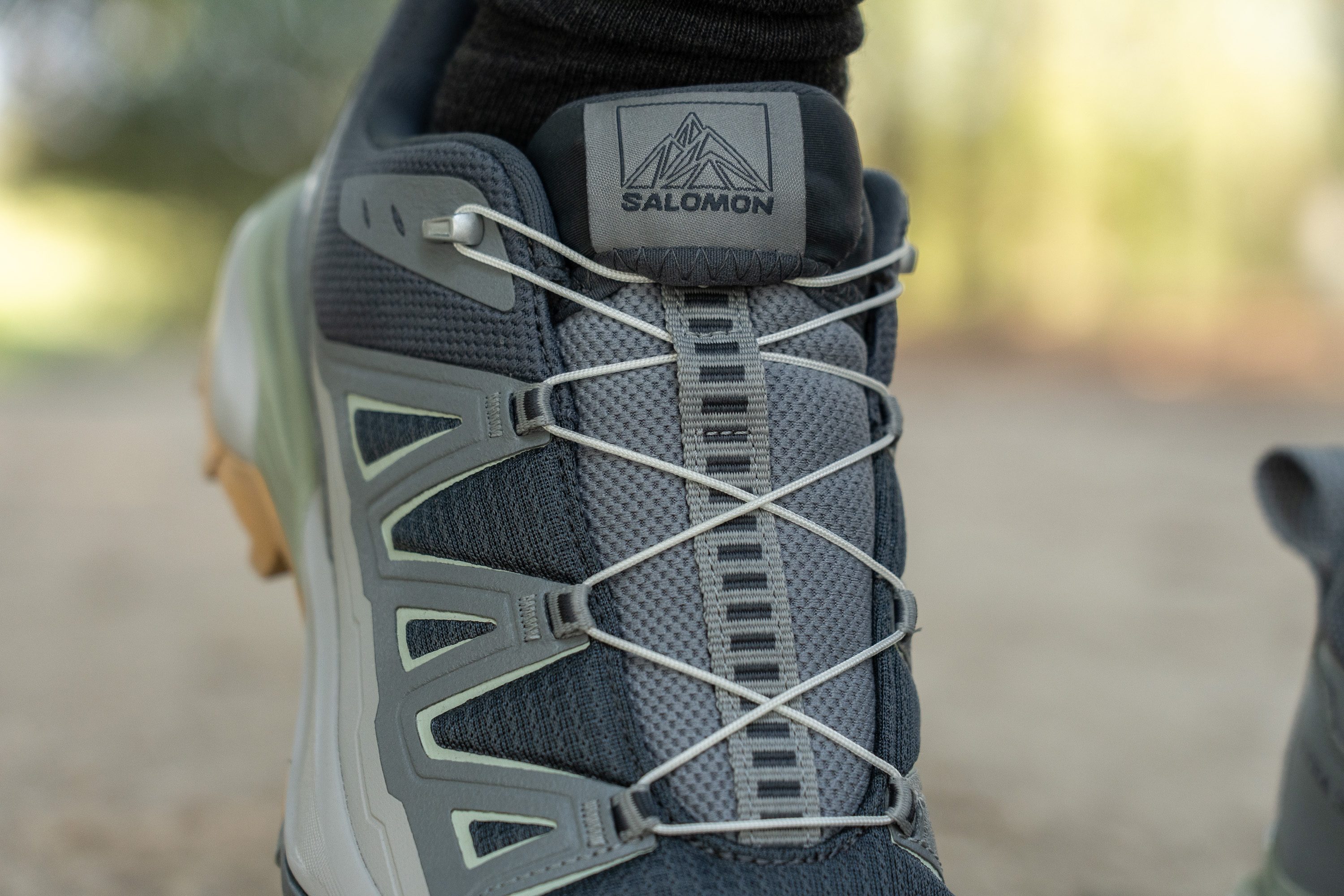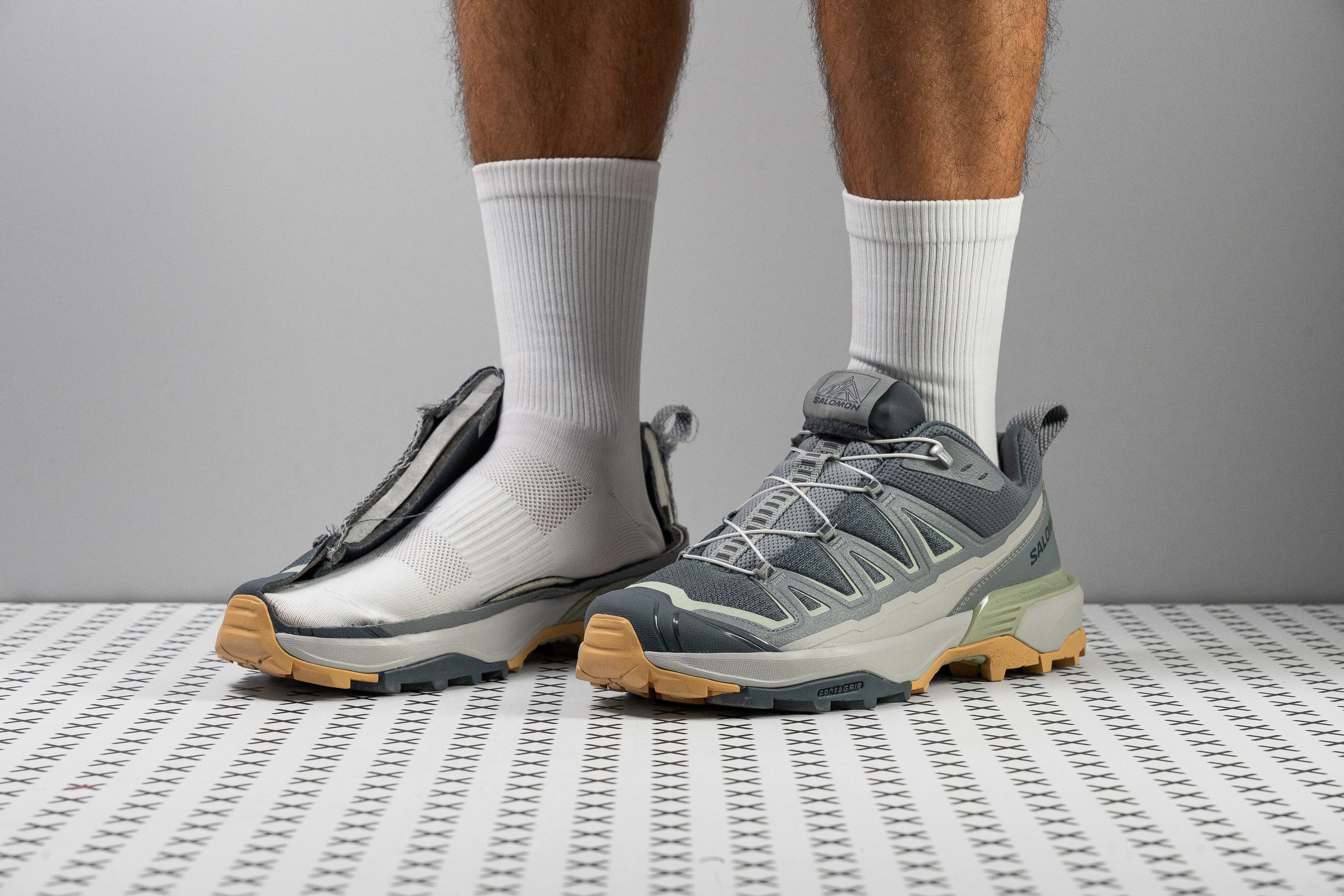Our verdict
Pros
- Grounded and trail-connected
- Great lateral stability and support
- Fantastic traction on various terrains
- Excellent wear-resistance and durability
- Easy fit regulation with Quicklace
- Decent breathability for summer hikes
- Generously padded upper
Cons
- Not much shock absorption
- Not for wide feet
- Gets even firmer in cold
Audience verdict
Comparison
The most similar hiking shoes compared
+ + Add a shoe | |||||
|---|---|---|---|---|---|
| Audience score | 69 Decent! | 84 Good! | 73 Good! | 89 Great! | |
| Price | £150 | £70 | £140 | £110 | |
| Trail terrain | Moderate | LightModerate | Moderate | Technical | |
| Shock absorption | Low | Moderate | Low | Low | |
| Energy return | Moderate | Moderate | Moderate | Moderate | |
| Weight lab Weight brand | 13.5 oz / 383g 12.8 oz / 363g | 13.4 oz / 380g 12.3 oz / 350g | 12.9 oz / 367g 12.3 oz / 350g | 15.3 oz / 434g 16.2 oz / 460g | |
| Lightweight | ✓ | ✓ | ✓ | ✗ | |
| Breathability | Moderate | Breathable | Breathable | Breathable | |
| Use | Day Hiking | Day HikingLight HikingBeginners | Day HikingBeginners | Day HikingBeginners | |
| Orthotic friendly | ✓ | ✓ | ✓ | ✓ | |
| Drop lab | 10.2 mm | 13.7 mm | 15.5 mm | 11.2 mm | |
| Size | - | True to size | Slightly small | True to size | |
| Midsole softness | Firm | Balanced | Balanced | Firm | |
| Difference in midsole softness in cold | Normal | Big | Normal | Normal | |
| Torsional rigidity | Stiff | Stiff | Stiff | Moderate | |
| Heel counter stiffness | Moderate | Moderate | Moderate | Flexible | |
| Stiffness | Moderate | Flexible | Moderate | Flexible | |
| Outsole hardness | - | Average | Average | Average | |
| Material | - | LeatherMeshSuede | - | LeatherMesh | |
| Season | All seasons | SummerAll seasons | SummerAll seasons | SummerAll seasons | |
| Toebox durability | Good | Very good | Good | - | |
| Heel padding durability | Bad | Bad | Decent | - | |
| Outsole durability | Decent | Decent | Decent | - | |
| Width / fit | Medium | Medium | Wide | Medium | |
| Toebox width | Medium | Medium | Medium | Medium | |
| Lug depth | 4.5 mm | 3.2 mm | 4.5 mm | 4.8 mm | |
| Heel stack lab | 29.1 mm | 32.7 mm | 34.4 mm | 31.7 mm | |
| Forefoot | 18.9 mm | 19.0 mm | 18.9 mm | 20.5 mm | |
| Widths available | Normal | NormalWide | Normal | NormalWide | |
| Technology | Ortholite | - | Ortholite | Vibram | |
| Heel tab | Finger loop | Finger loop | Finger loop | Finger loop | |
| Removable insole | ✓ | ✓ | ✓ | ✓ | |
| Ranking | #34 Bottom 2% | #20 Bottom 42% | #32 Bottom 8% | #7 Top 20% | |
| Popularity | #20 Bottom 42% | #25 Bottom 28% | #14 Top 40% | #1 Top 3% |
Who should buy
Consider the X Ultra 360 Edge if you recognise yourself in the following:
- you need a sturdy shoe for shorter hikes on mixed terrain (from rocks to mud)
- you prefer trail awareness over max-cushioned platforms
- you look for a breathable yet durable shoe for summer hiking
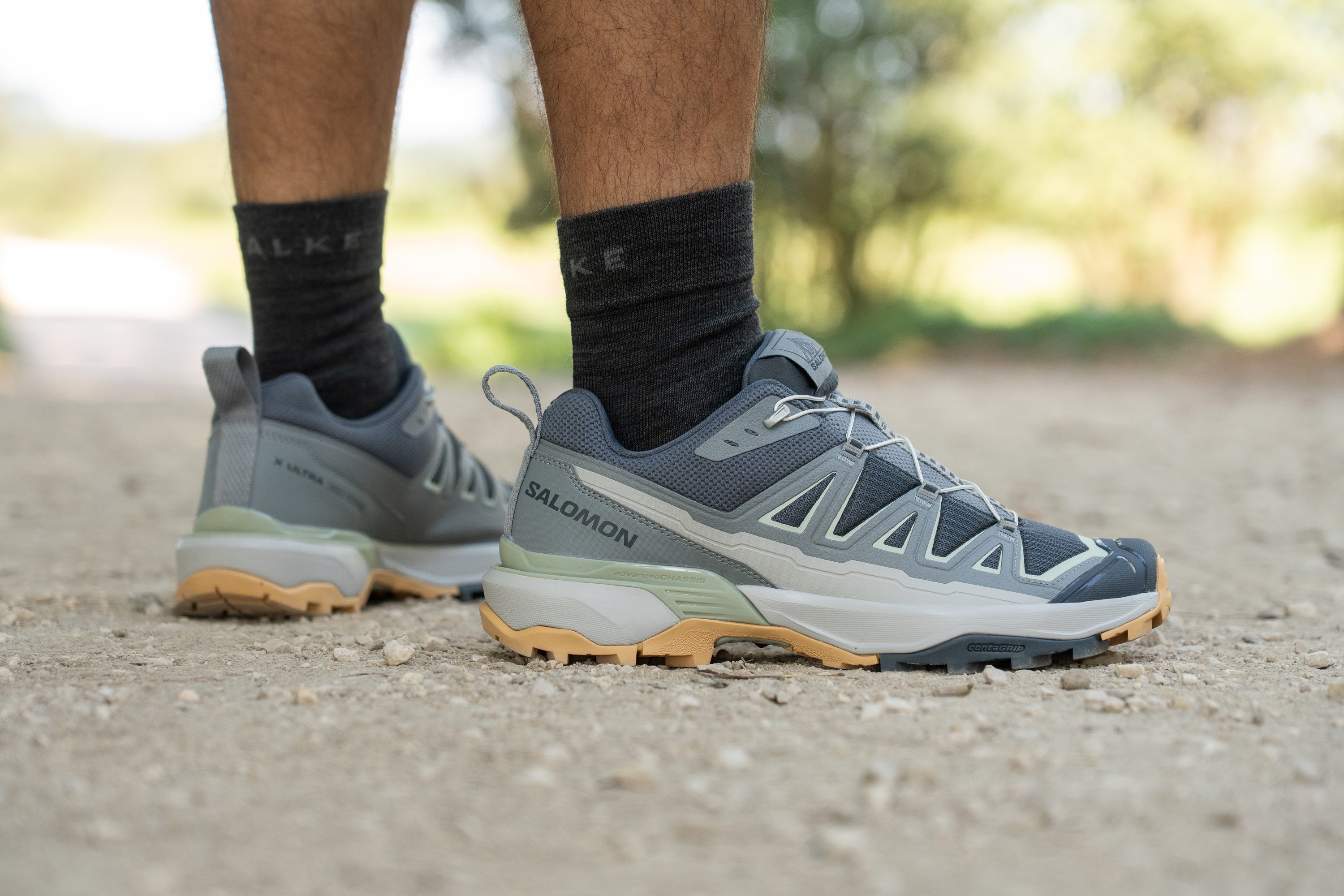
Who should NOT buy
The rigid nature of this Salomon shoe might be a turn-off for people who value pure comfort and cushioning on the trail. That's the realm of HOKA shoes like the Anacapa 2 Low GTX.
Another dealbreaker could be the shoe's snug toebox, and in that case, the Merrell Moab Speed 2 is likely to be more suitable.
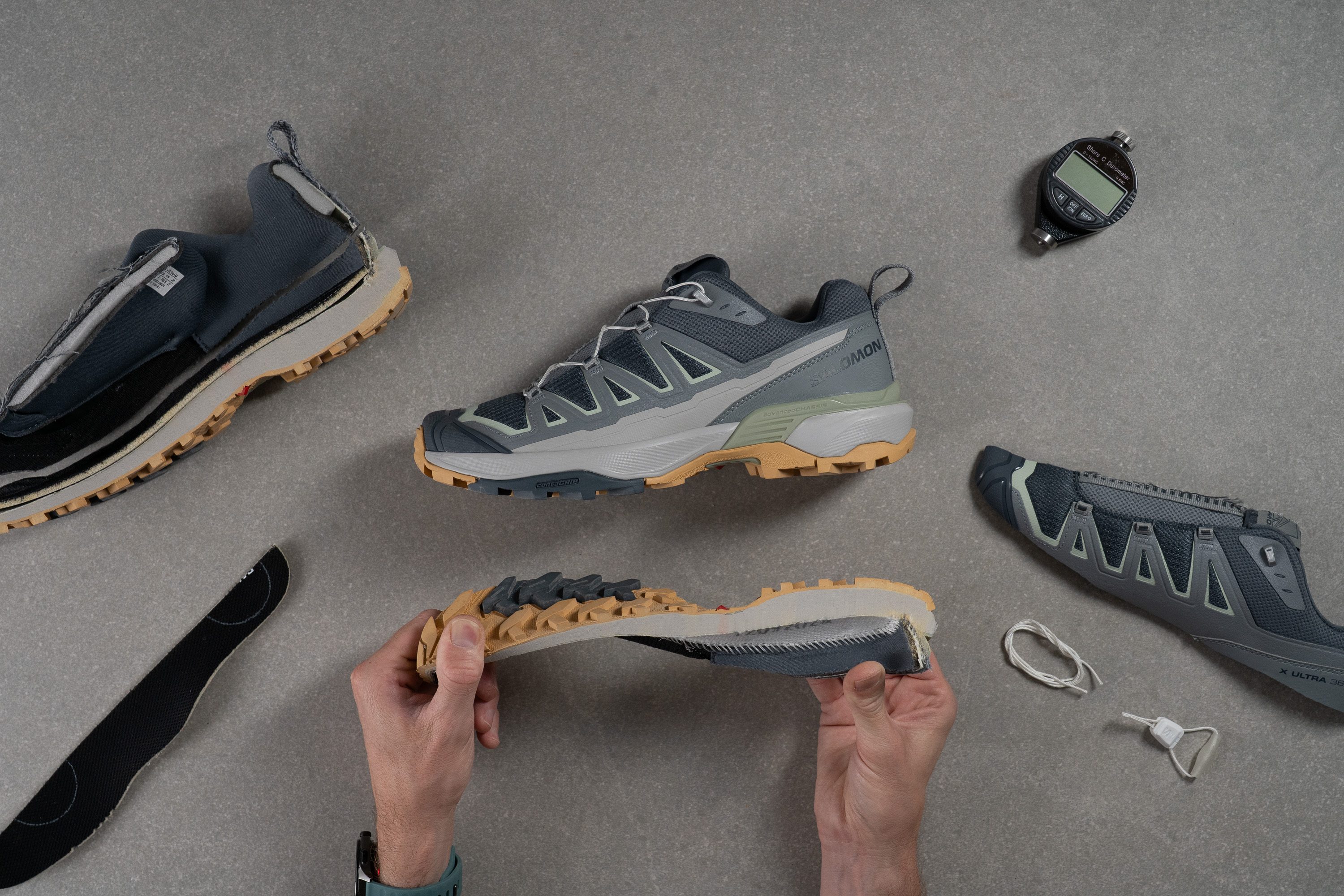
You might as well want to know the differences between the X Ultra 360 Edge variations themselves to figure out which one matches you neds the most:
- X Ultra 360 Edge GTX: the shoe's waterproof Gore-Tex version
- X Ultra 360: the cheapest version in the series with no recycled materials
- X Ultra 360 Leather GTX: like the X Ultra 360 but with Gore-Tex waterproofing and genuine leather in the upper
Cushioning
Shock absorption
With their low-profile and rigid builds, Salomon shoes tend to be the least cushioned hiking options on the market. The same proved to be true for the X Ultra 360 Edge as its midsole returned some of the lowest shock absorption measurements in our lab - 85 SA.
This shoe can feel a bit harsh and barebones for someone coming from well-cushioned shoes like HOKA, but in return, it offers the benefit of amazing stability and trail awareness.
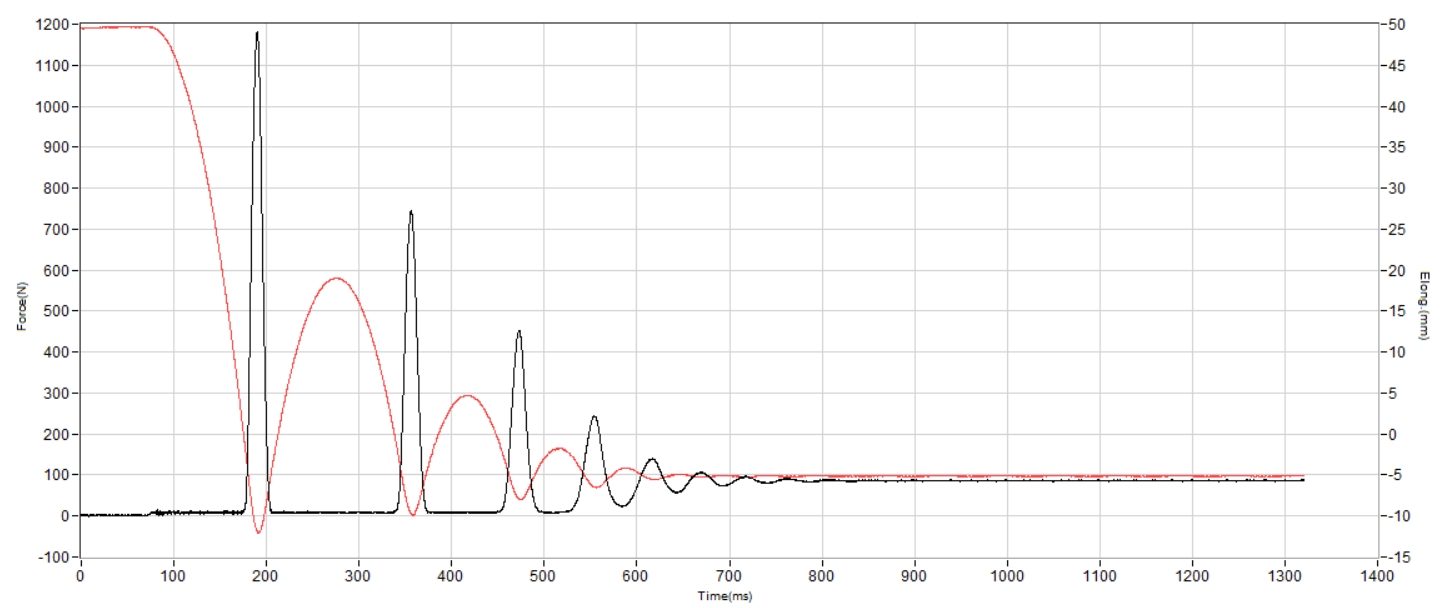
| X Ultra 360 Edge | 85 SA |
| Average | 104 SA |
Energy return
The energy return of this Salomon model also returned a very moderate result of 46.8%. There is no apparent springback or bounce to this shoe's platform, and the ride feels flat yet grounded.
| X Ultra 360 Edge | 46.8% |
| Average | 50.2% |
Heel stack
The X Ultra 360 Edge showed some of the lowest stack height measurements in our hiking shoe lineup. Even though it's not minimal, it feels pretty close to the trail at 29.1 mm in the heel.
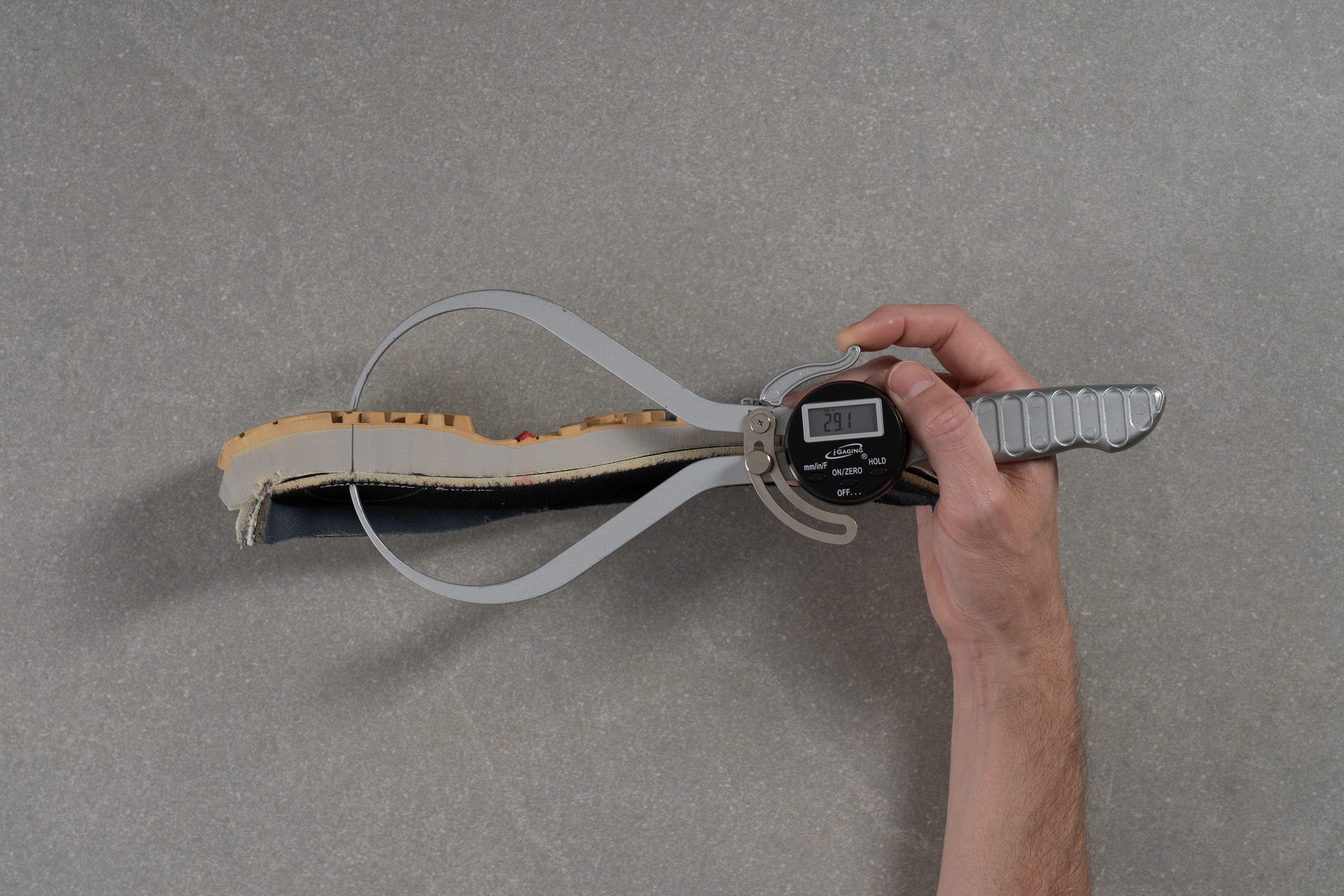
| X Ultra 360 Edge | 29.1 mm |
| Average | 32.8 mm |
Forefoot stack
Our calliper recorded another below-average measurement in the shoe's forefoot. At 18.9 mm, it offers a very trail-connected experience.
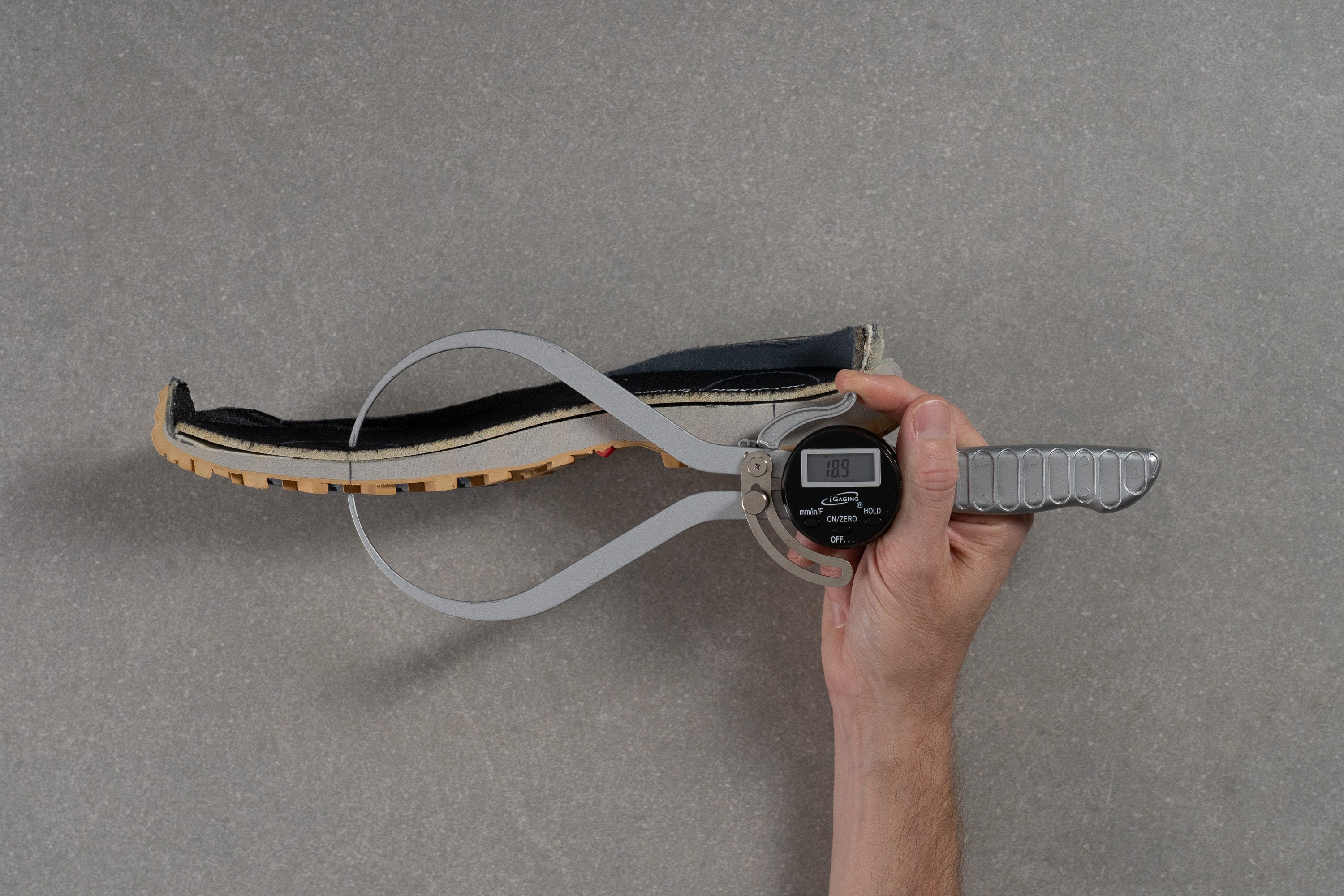
| X Ultra 360 Edge | 18.9 mm |
| Average | 22.0 mm |
Drop
Despite its lower stack height, the heel-to-toe drop of the Salomon X Ultra 360 Edge remains comparable to the average.
Its 10.2 mm offset is going to feel familiar to many outdoor enthusiasts because most hiking shoes put the heel in an elevated position to reduce stress on the Achilles and calves on long-distance hikes.
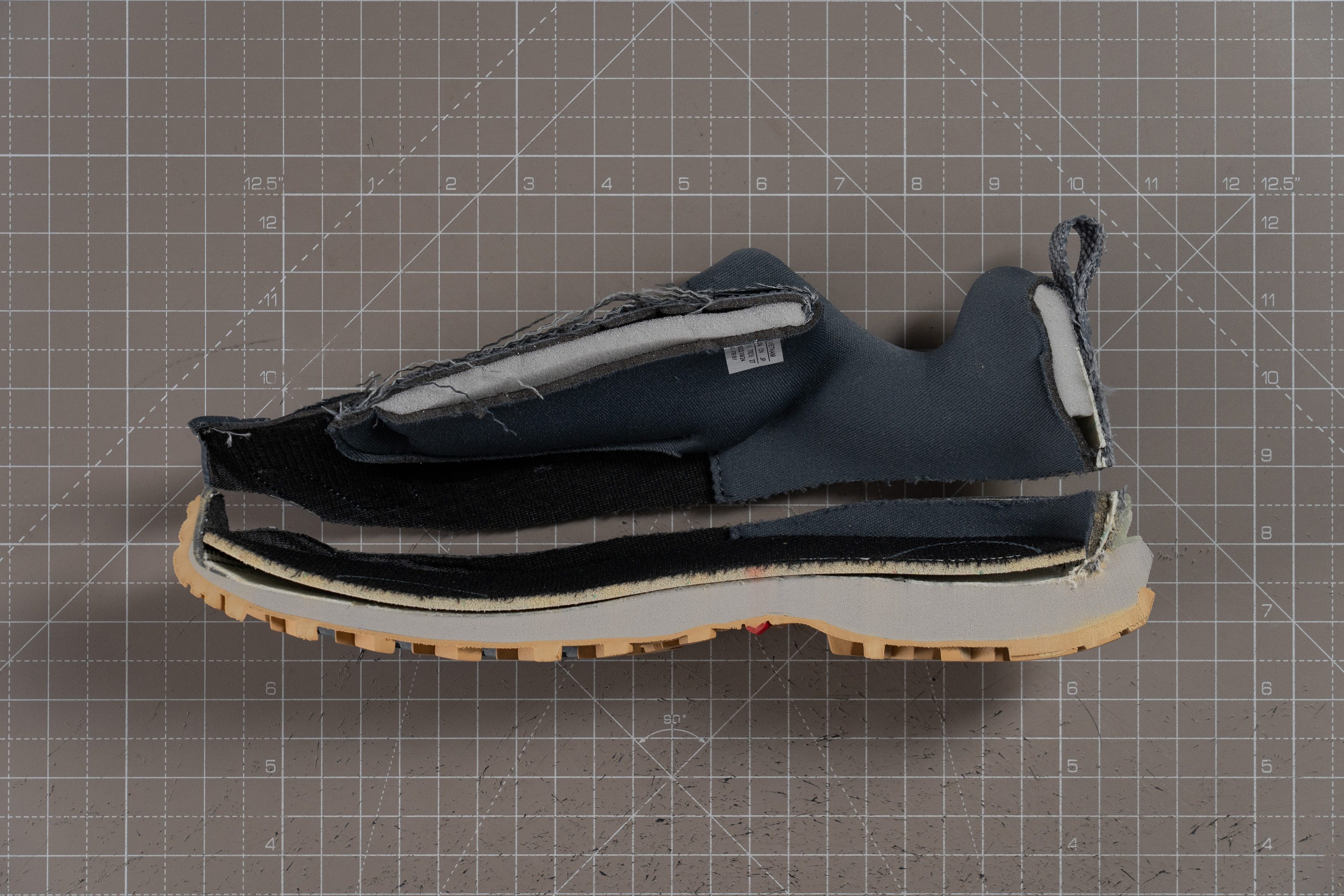
| X Ultra 360 Edge | 10.2 mm |
| Average | 10.7 mm |
Midsole softness
A full-length Energy Cell foam is responsible for the X Ultra 360 Edge's midsole cushioning.
Actually, the word 'buffer' would be more suitable than 'cushioning' when describing this foam component. Our durometer proved it to be quite firm with a high reading of 31.3 HA.
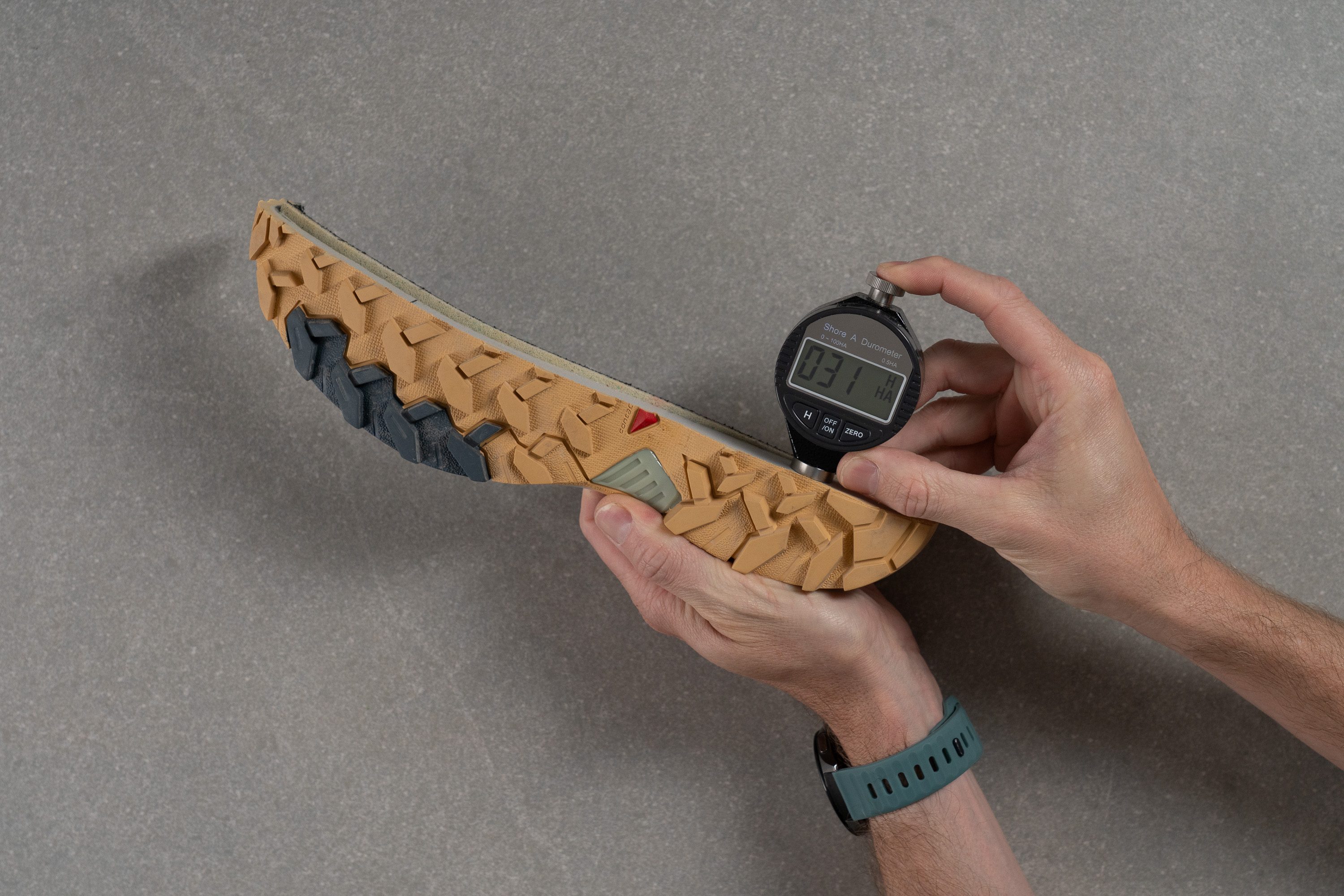
| X Ultra 360 Edge | 31.3 HA |
| Average | 27.0 HA |
Size and fit
Size
Width / Fit
Salomon shoes tend to be pretty streamlined, which often results in a snugger fit. To check if that stands true for the X Ultra 360 Edge, we created a gel mould of its interiors.
Measuring the shoe's solidified mould in its widest part (the ball of the foot), our calliper returned a standard reading of 95.1 mm. This is just right for a hiking shoe in a men's US size 9 and a D medium fit.
But please note that wider versions are not available for this Salomon shoe.
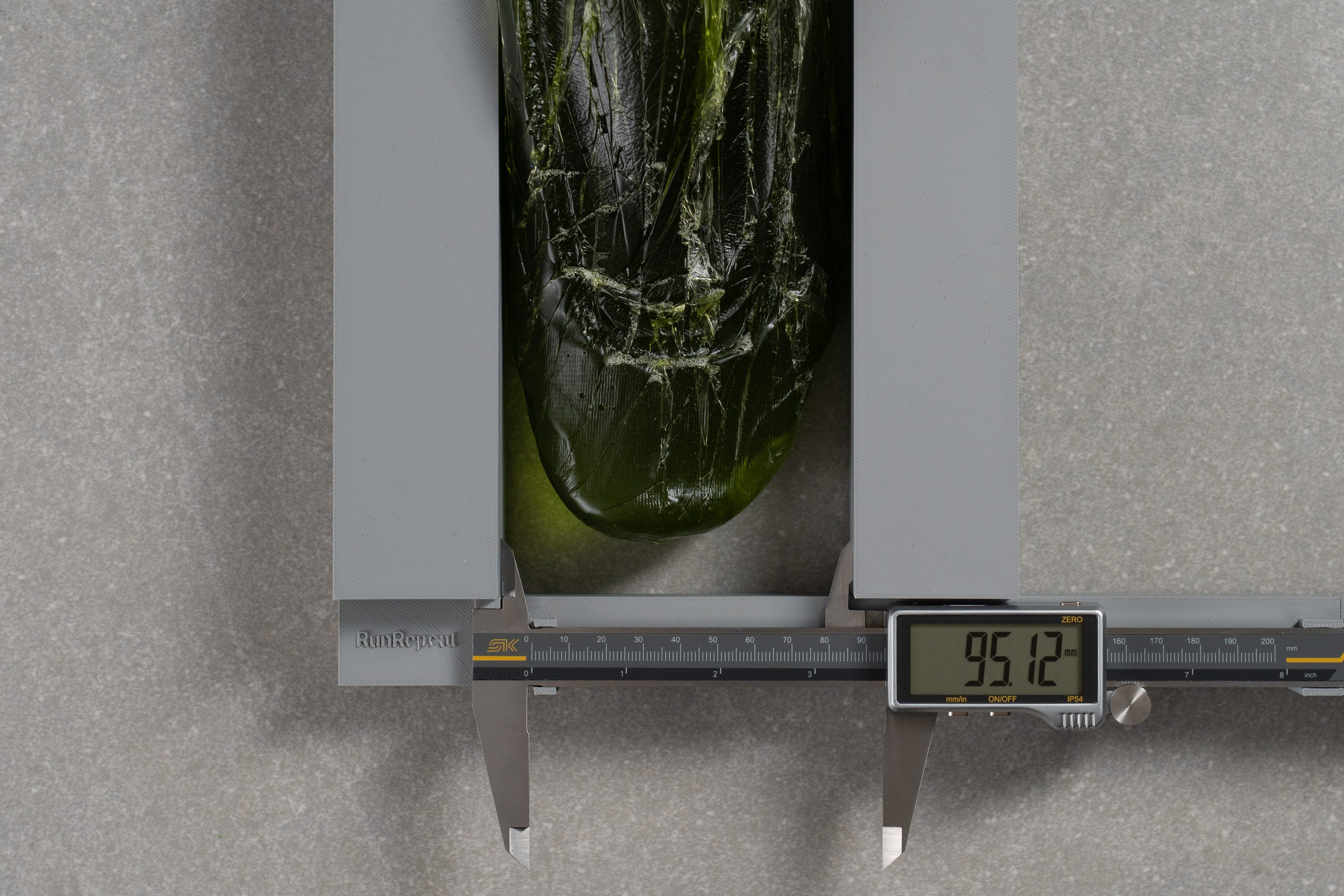
| X Ultra 360 Edge | 95.1 mm |
| Average | 94.1 mm |
Toebox width
Now this is where some people may have trouble with the X Ultra 360 Edge.
Our calliper confirmed that its toebox gets notably narrower towards the toes, resulting in a below-average width of. 70.9 mm in the big toe area.
This is on the edge of comfortable for a medium-width foot and can be a problem for some foot shapes and conditions, especially if they tend to swell mid-hike.
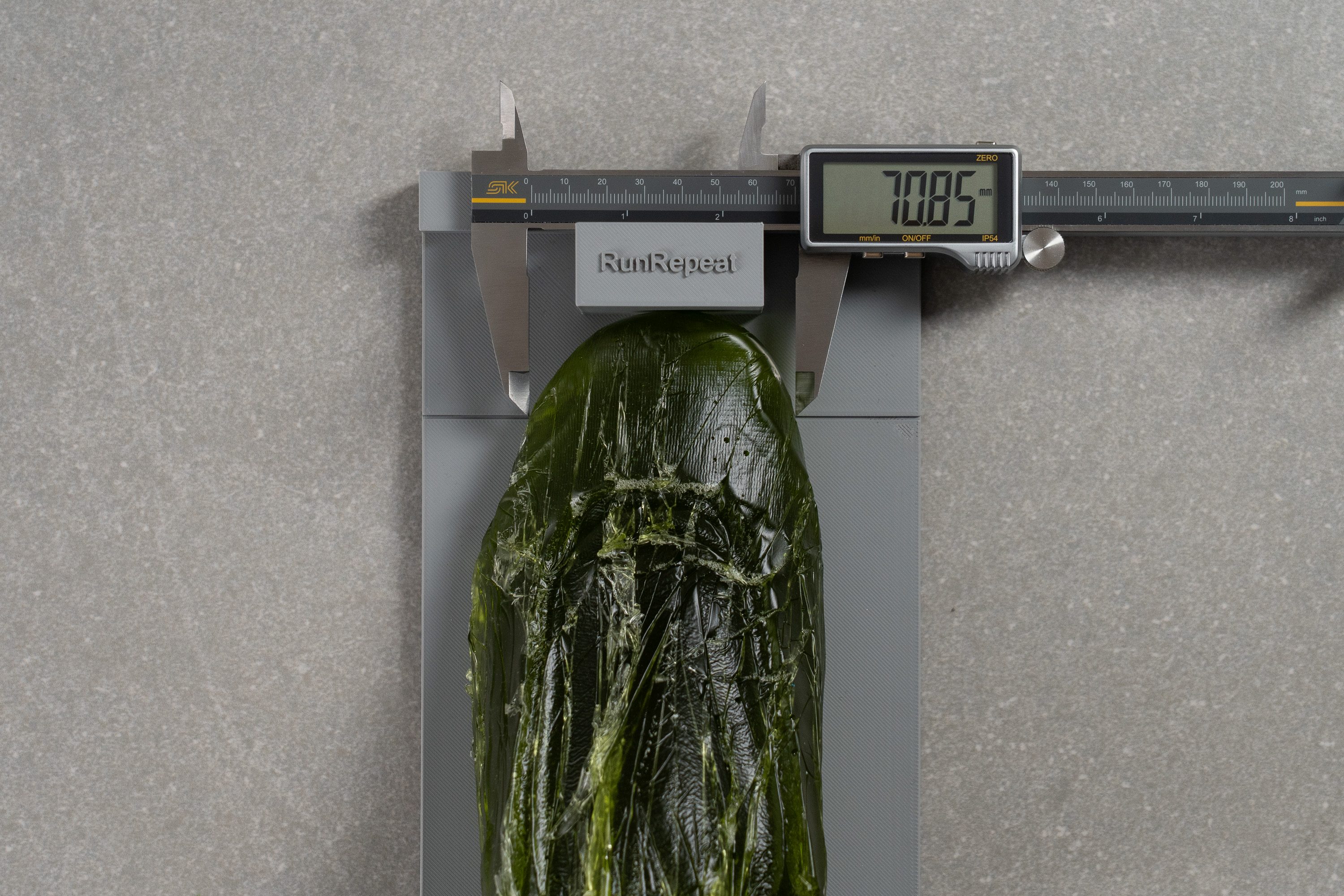
| X Ultra 360 Edge | 70.9 mm |
| Average | 72.5 mm |
Toebox height
But at least the shoe's vertical space is not limited.
With a regular toebox height of 28.2 mm, this Salomon shoe doesn't put any pressure on top of one's toes.
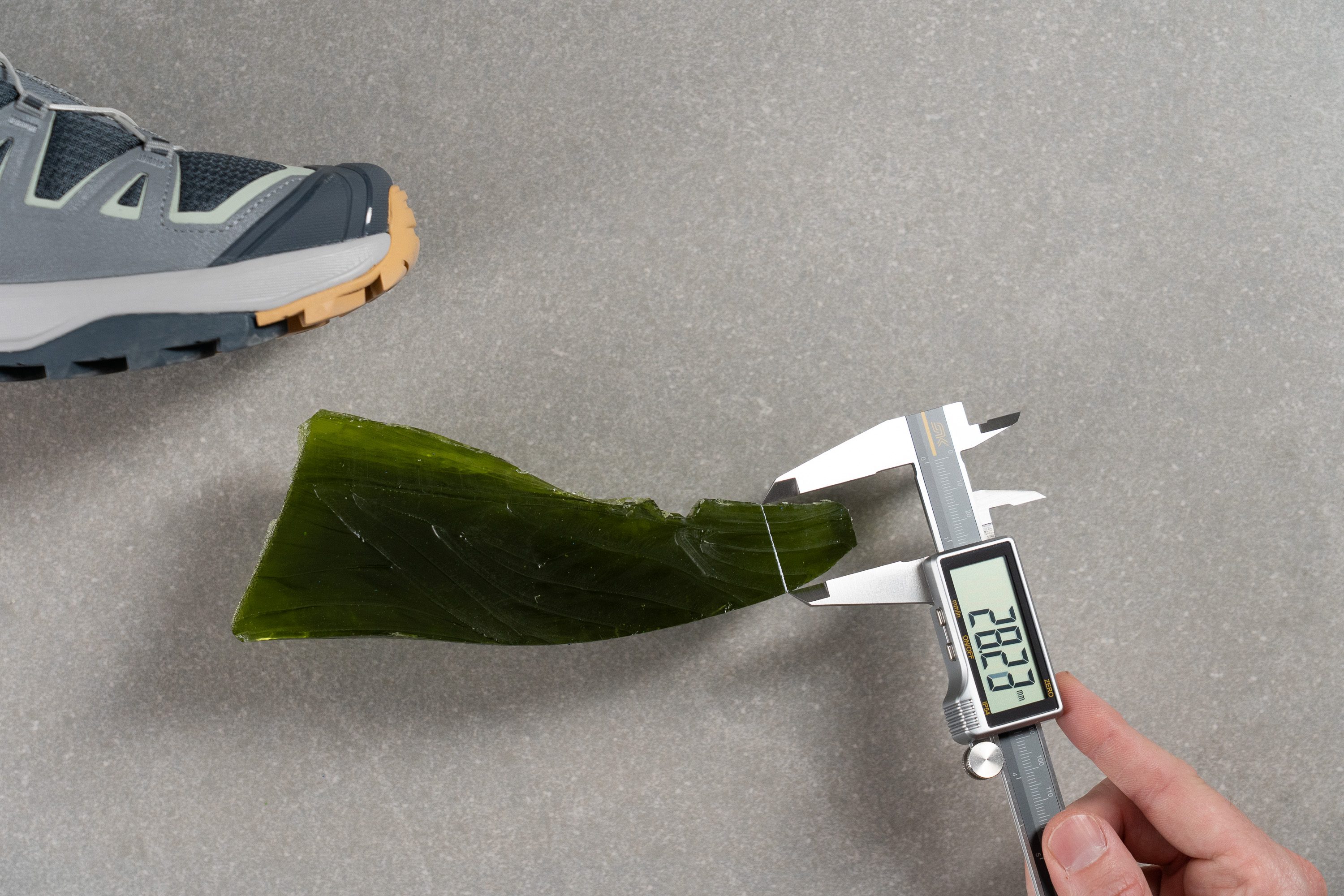
| X Ultra 360 Edge | 28.2 mm |
| Average | 28.0 mm |
Traction / Grip
Forefoot traction
To check how the shoe's All Terrain ContraGrip outsole behaves on smooth and wet surfaces, we tested its friction capacity on a wet slab of concrete.
Fortunately, Salomon proved its mighty grip yet again and showed a sliding friction coefficient of 0.56 in the shoe's forefoot.
There is a high chance of staying surefooted on wet boulders or stream-polished river rocks in the X Ultra 360 Edge!
| X Ultra 360 Edge | 0.56 |
Lug depth
The X Ultra 360 Edge was designed for a mixed but moderate type of terrain, including some rocks, mossy downed trees, and light mud. So its 4.5 mm lugs provide a perfect middle ground between hard-packed and soft terrain.
But if you need a shoe for tackling technical, off-camber terrain with some scrambling along the way, the La Sportiva Ultra Raptor II is a much more suitable companion.
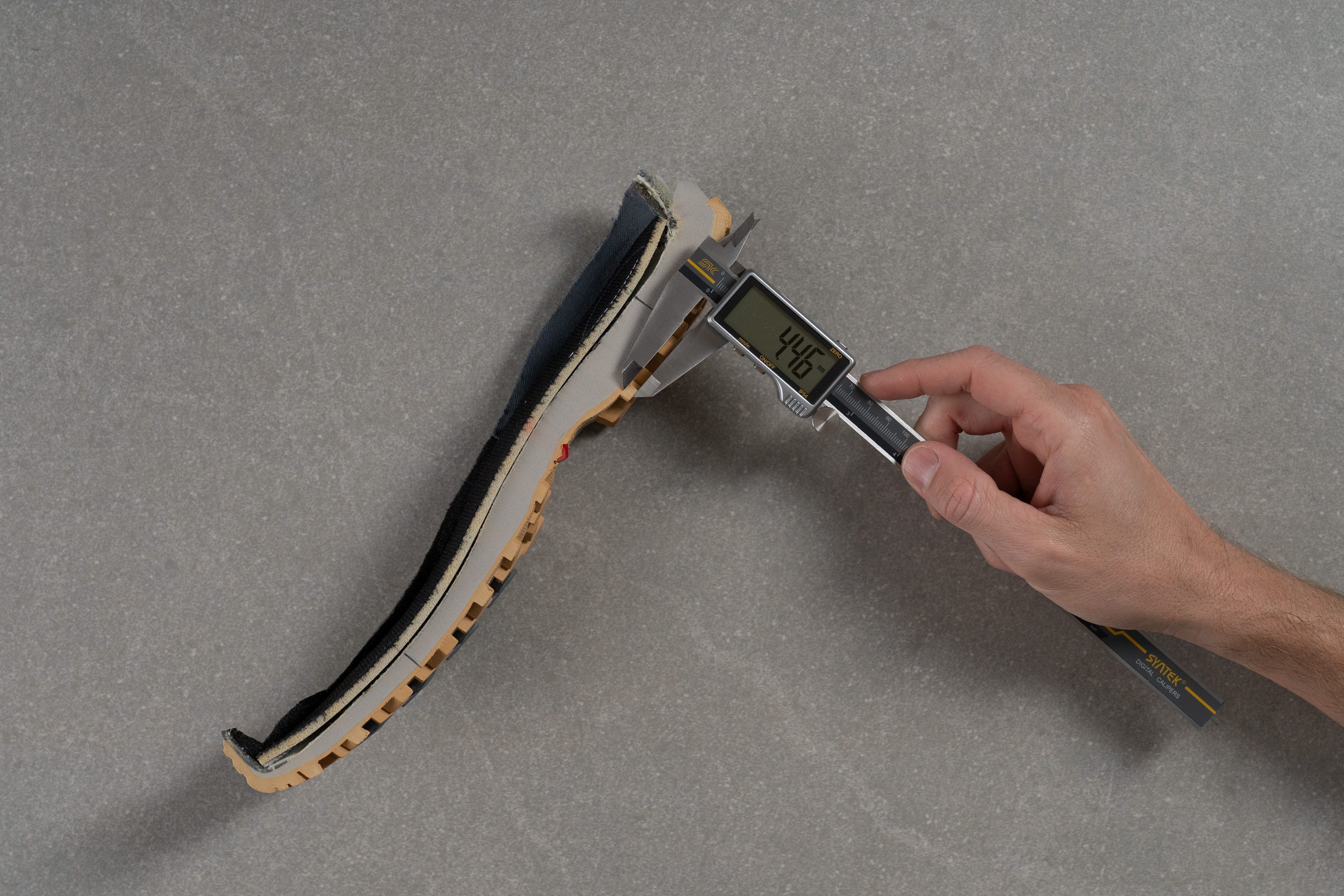
| X Ultra 360 Edge | 4.5 mm |
| Average | 4.0 mm |
Outsole design
This Salomon shoe features a winning mix of larger and smaller chevron lugs and a pronounced heel brake to be effective on hilly terrain with steep ascents and descents.
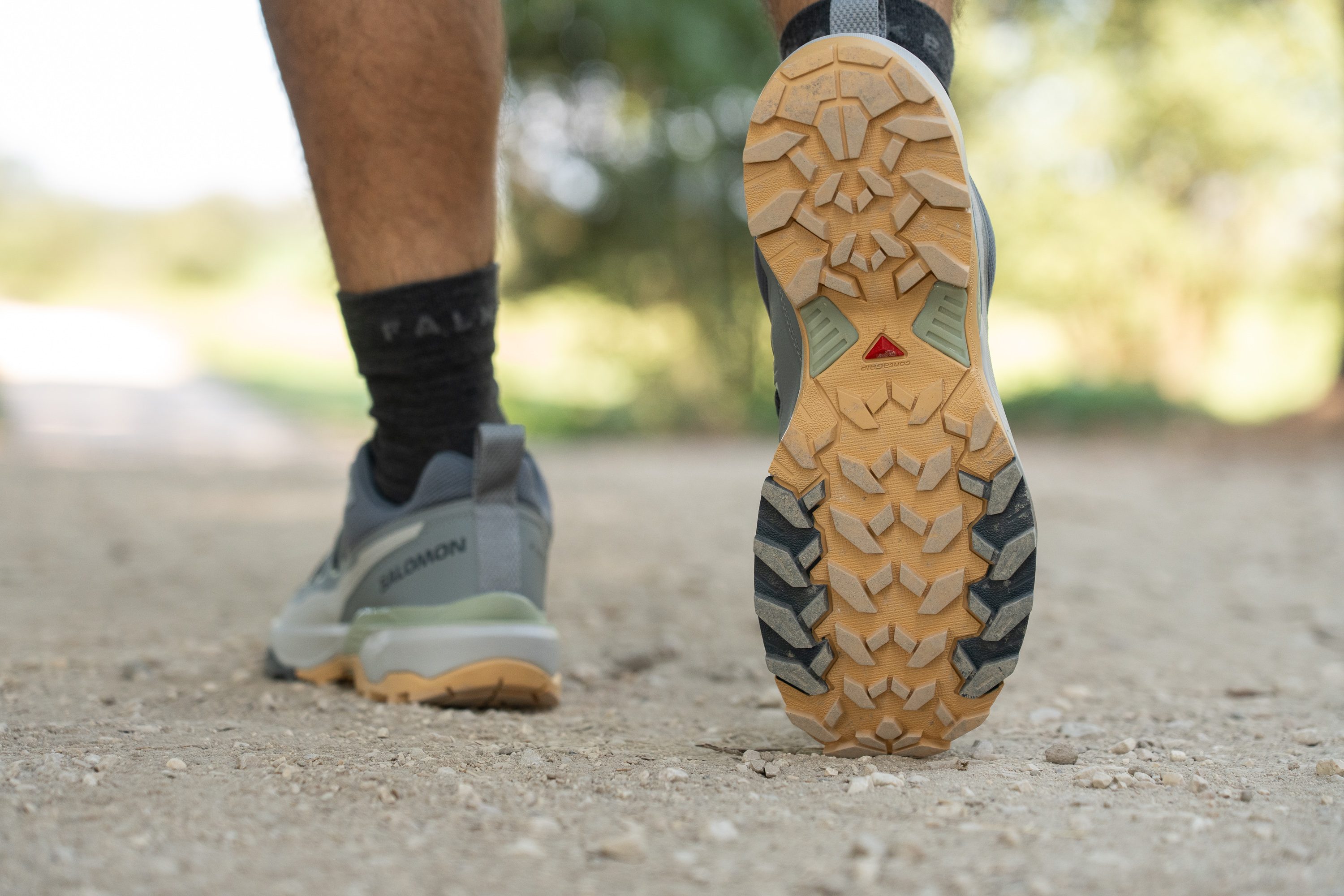
Flexibility / Stiffness
Despite its robust appearance, the Salomon X Ultra 360 Edge showed decent flexibility in our bending test.
It took 15.2N of force to bend the shoe by 30 degrees, which is even a bit less than it takes for an average hiking shoe. So you get to have some natural forefoot pliability and better proprioception on the trail.
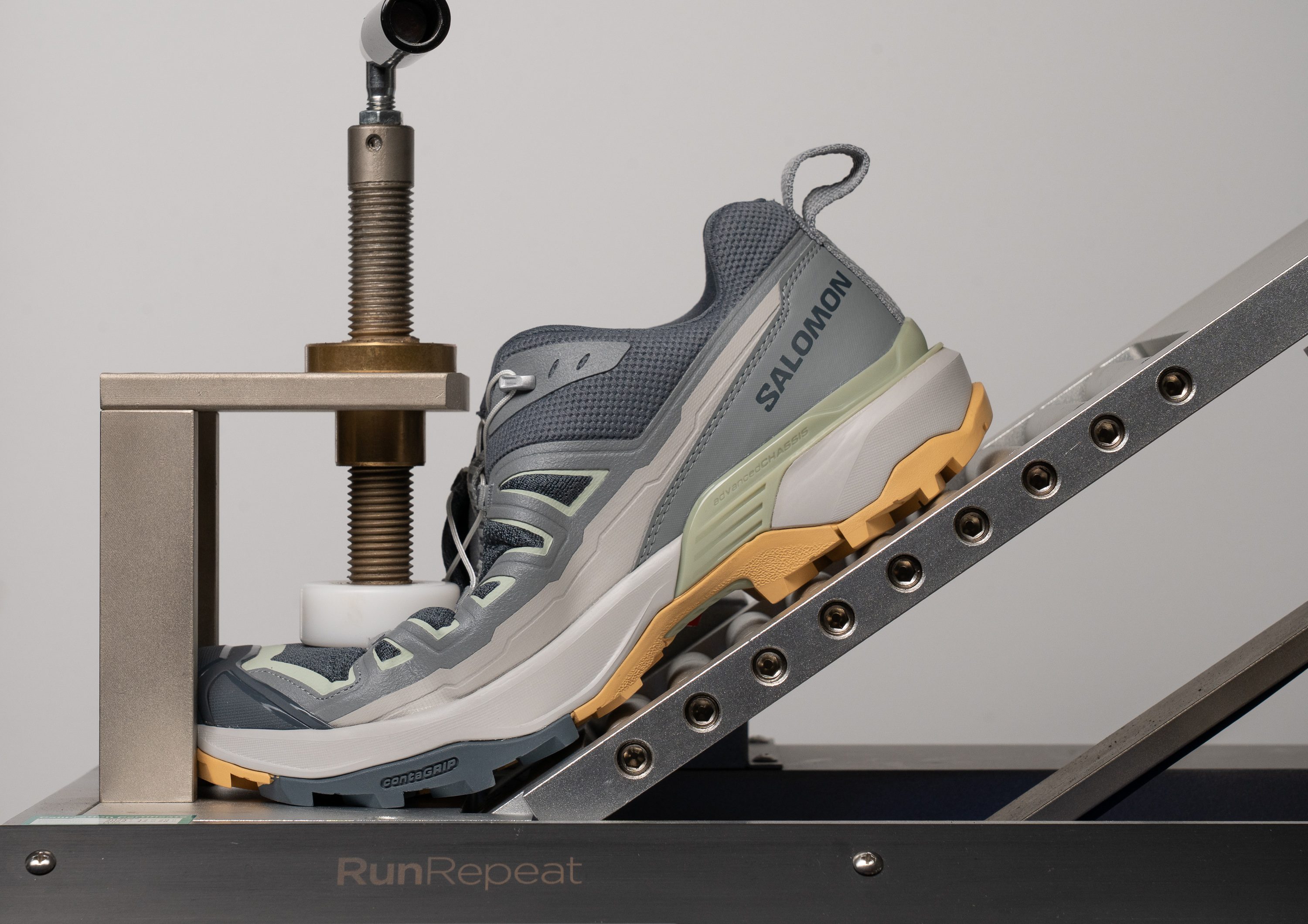
| X Ultra 360 Edge | 15.2N |
| Average | 18.3N |
Weight
Weighing the X Ultra 360 Edge in a men's US size 9, our scale returned a standard reading of 13.5 oz (383g).
Even though it could be lighter as a non-waterproof shoe with a lower stack height, we believe that its weight is reasonable given the stability it offers.
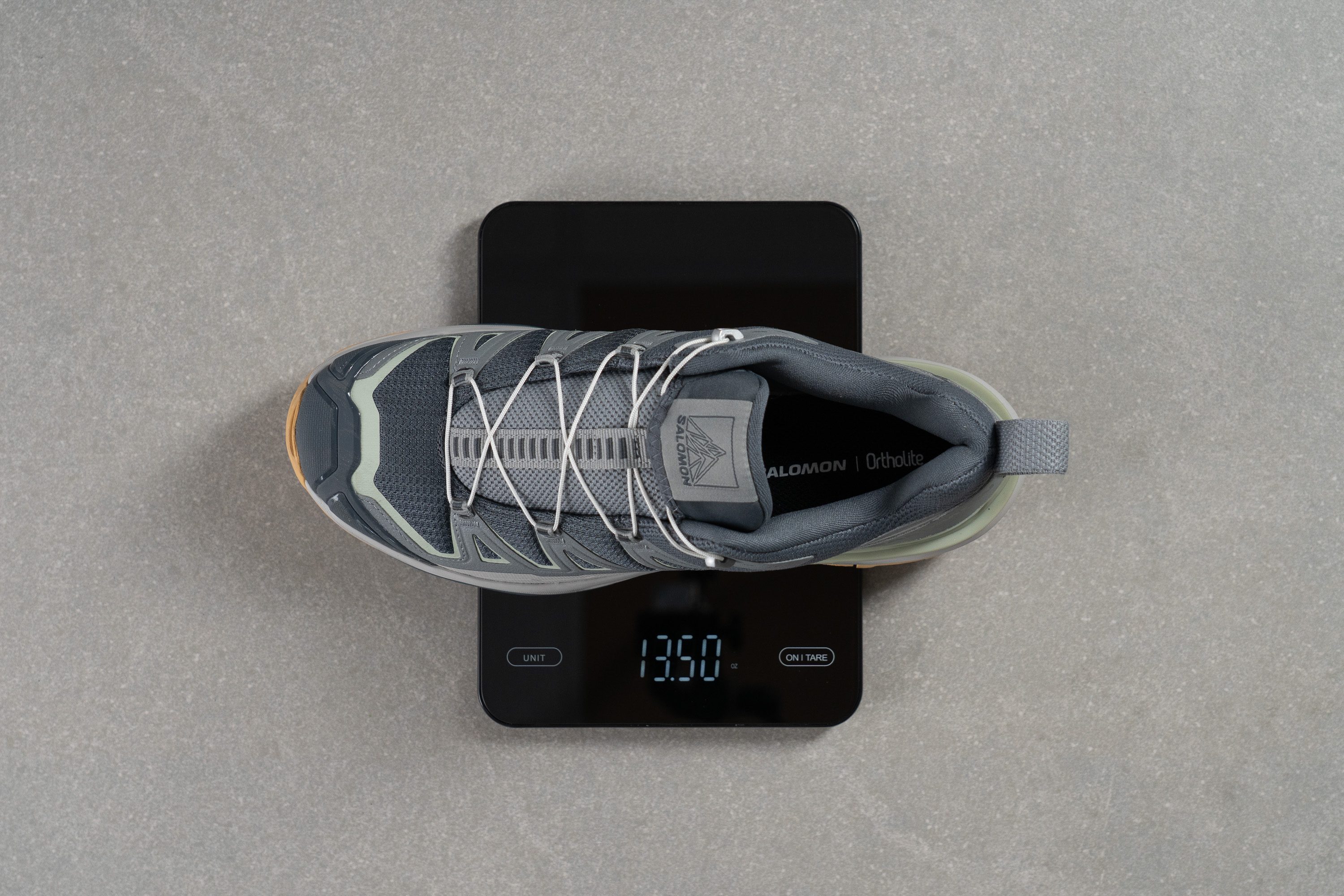
| X Ultra 360 Edge | 13.5 oz (383g) |
| Average | 13.4 oz (380g) |
Breathability
In this review, we are looking at the non-waterproof version of the Salomon X Ultra 360 Edge, but its Gore-Tex (GTX) version is readily available at a slightly higher price.
Even though it comes without a waterproofing membrane, the X Ultra 360 Edge didn't show the highest levels of breathability and ventilation.
Its thick and heavily layered upper blocks some of the airflow and prevents us from giving this shoe the highest breathability score.
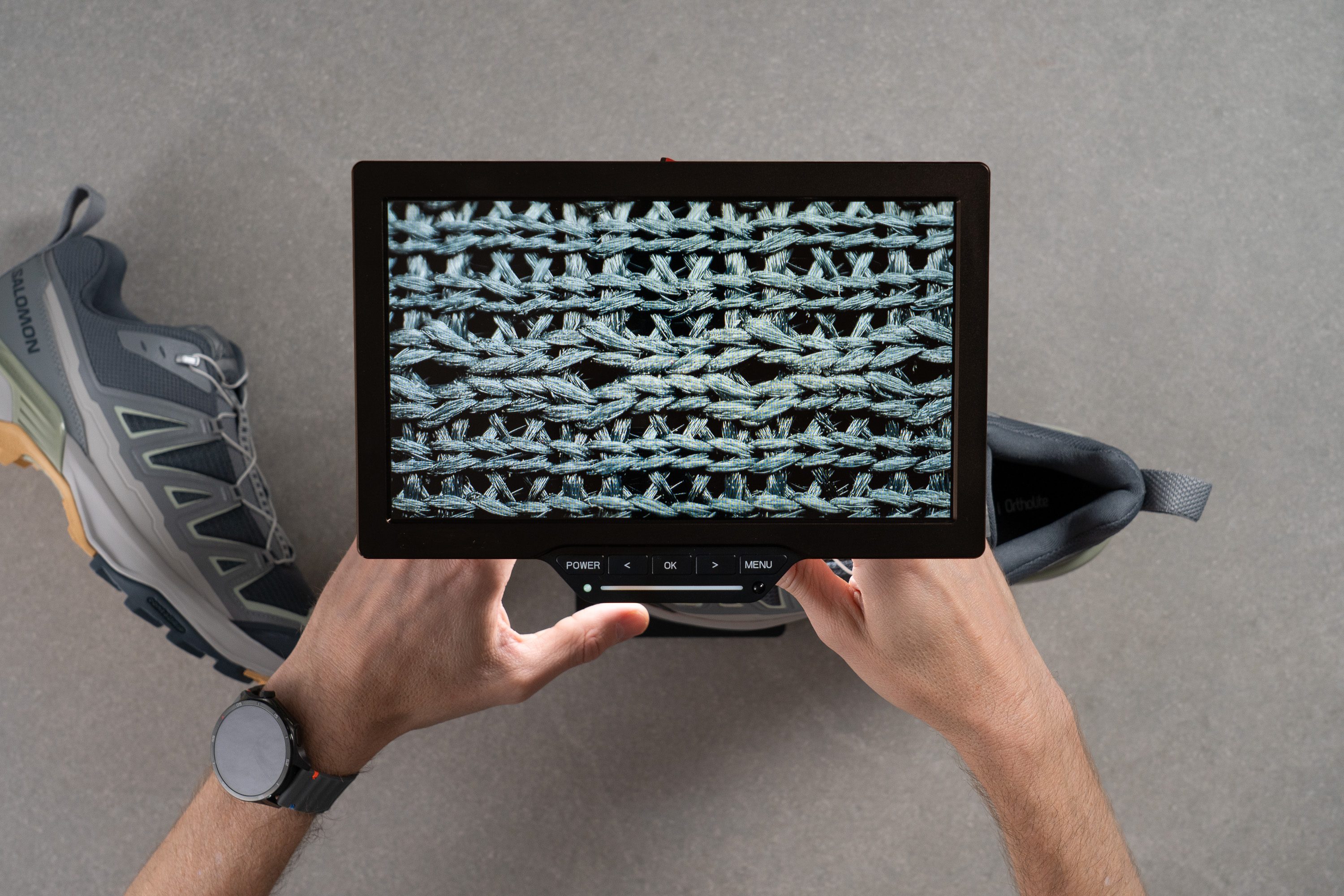
Completing our investigation with a close-up microscope look at its upper mesh, we ended up lowering the shoe's score to 3 out of 5. It's good for summer hikes, but perhaps not in the most scorching weather conditions.
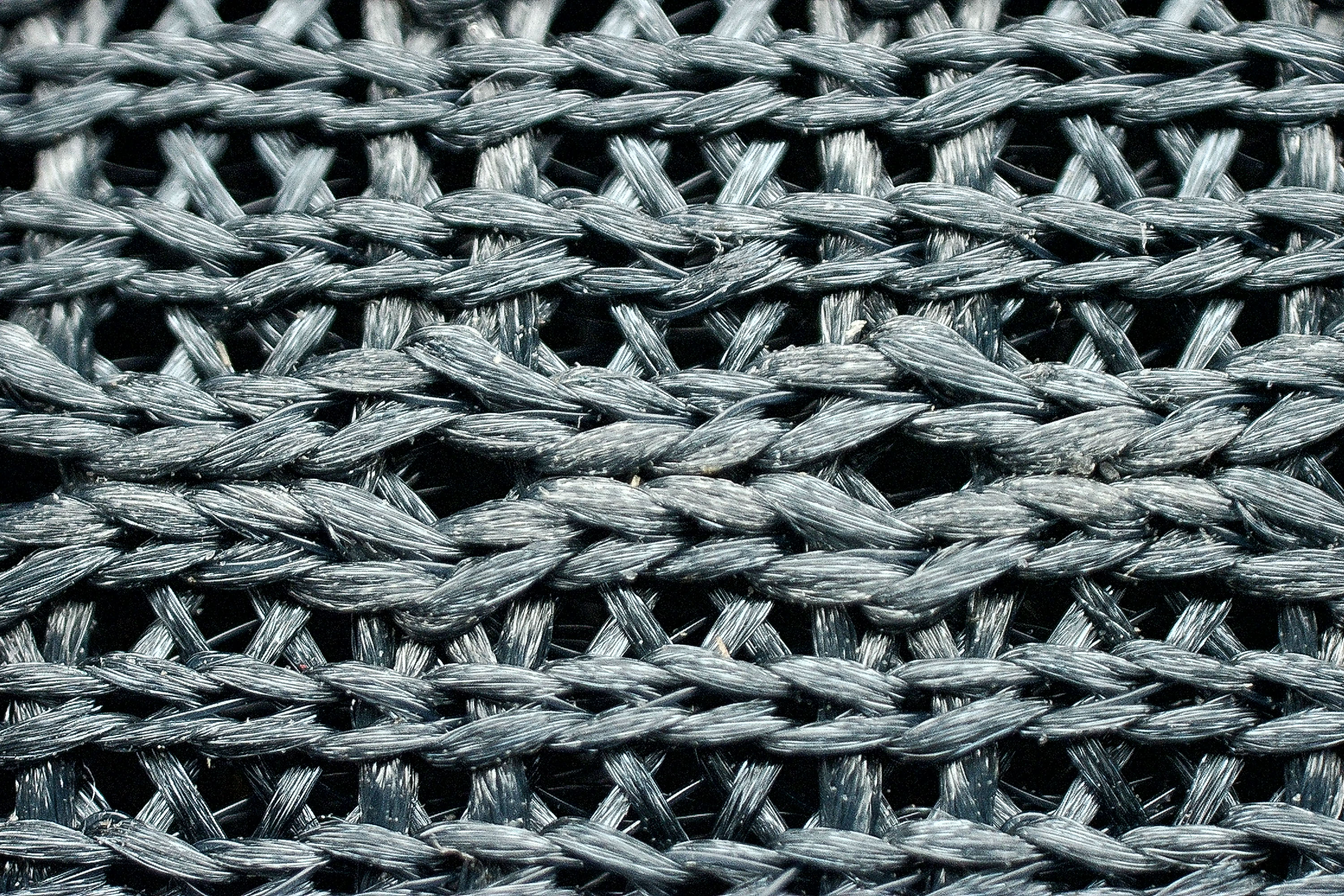
| X Ultra 360 Edge | 3 |
| Average | 2.4 |
Stability
Lateral stability test
Stability is the Salomon X Ultra series' forte, and the 360 Edge carries over its famous AdvancedChassis technology.
It's not as large and pronounced as in the X Ultra 5 GTX, but it gets the job done for the moderate hikes the 360 Edge shoe was created for in the first place.
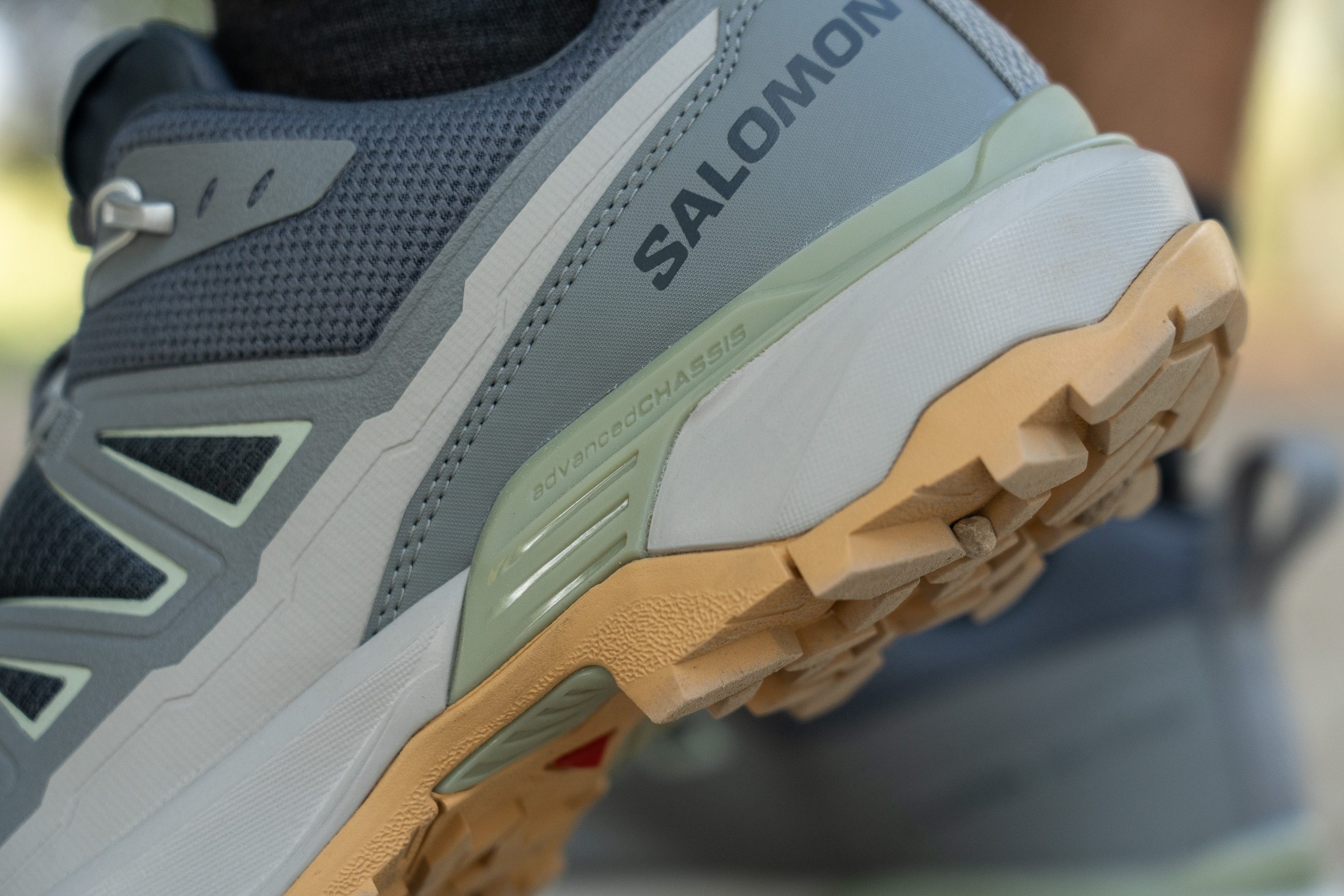
Made of stiff TPU, the AdvancedChassis starts in the midfoot and wraps around the heel to keep the foot as stable and surefooted as possible on uneven terrain, especially when a heavy backpack is involved.
Torsional rigidity
The chassis works together with the shoe's inherently firm midsole and stout upper to create a fairly rigid construction for a stable footing.
Our attempt to twist the shoe in a manual test showed little success, and we reflected that in its high torsional rigidity score of 4/5.
| X Ultra 360 Edge | 4 |
| Average | 3.7 |
Heel counter stiffness
The shoe's heel counter also showed a lot of resistance to our pushing and squeezing test and earned a high stiffness score of 4/5. We found that it cups the heel and ankle very securely to prevent them from wobbling and buckling.
| X Ultra 360 Edge | 4 |
| Average | 3.7 |
Midsole width - forefoot
Even with its slimmer profile, the Salomon X Ultra 360 Edge offers a sufficiently broad landing area. In fact, our calliper confirmed that the widest part of its forefoot is even a bit wider than average at 114.6 mm.
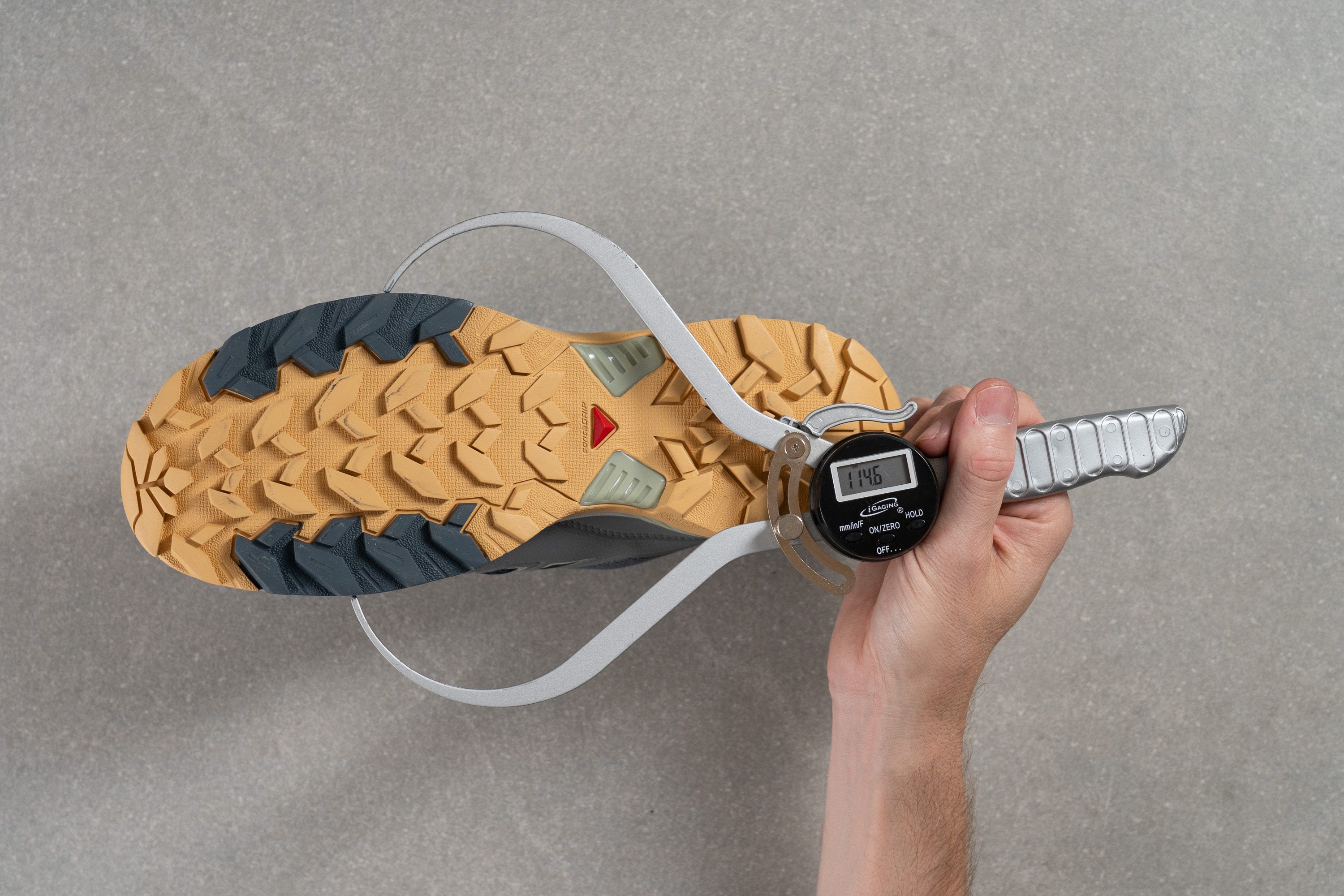
| X Ultra 360 Edge | 114.6 mm |
| Average | 111.3 mm |
Midsole width - heel
The heel, on the other hand, proved to be slightly narrower than average at 86.5 mm. But there is nothing to worry about, as this Salomon shoe's base feels nice and stable without being bulky for areas where more precise foot placement is preferred.
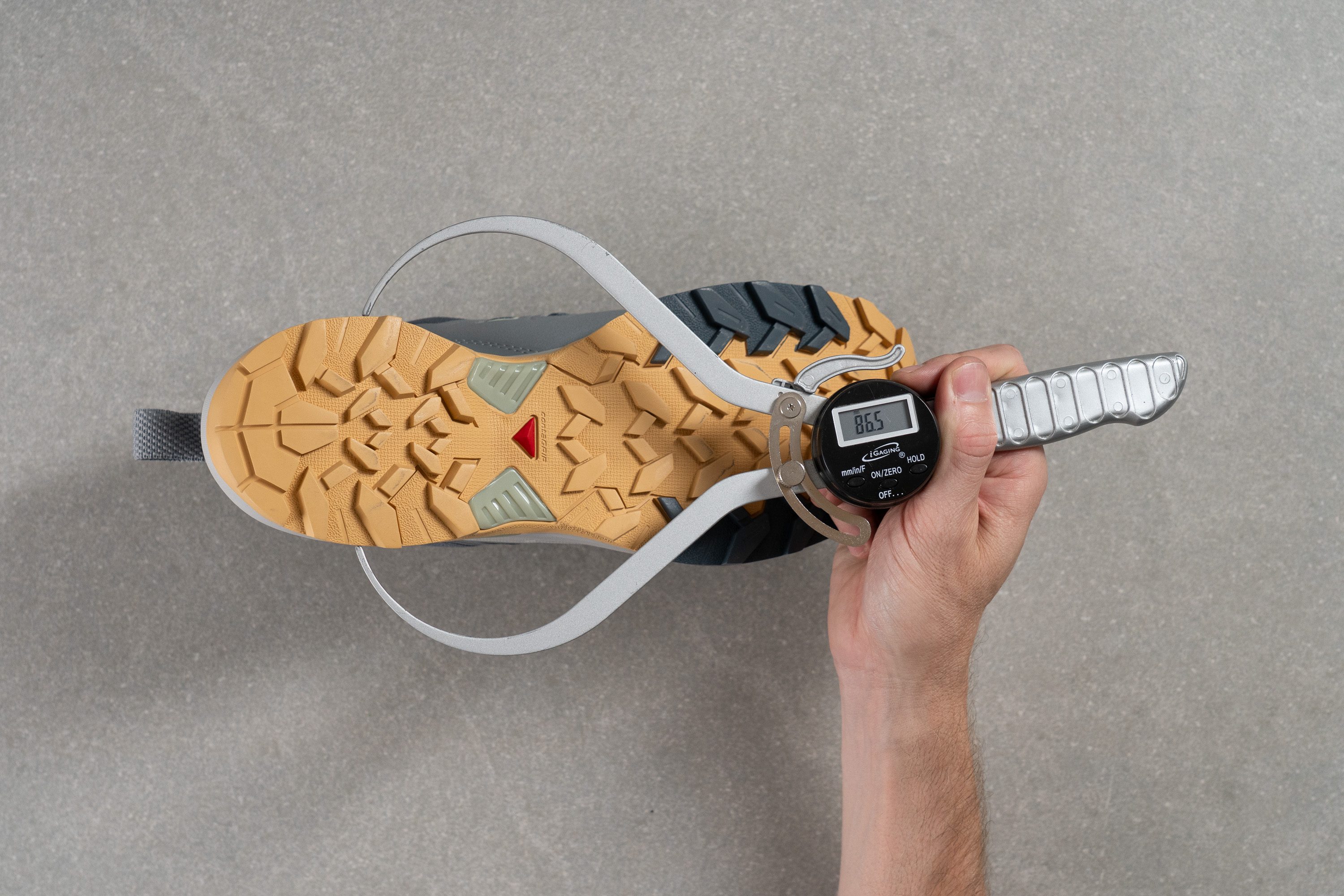
| X Ultra 360 Edge | 86.5 mm |
| Average | 87.9 mm |
Durability
Toebox durability
We can forgive the X Ultra 360 Edge's slightly obstructed breathability in exchange for the reliable foot protection and durability it offers.
A large area of the shoe's toebox is reinforced with a tough TPU toe bumper and synthetic overlays for toe protection and higher abrasion resistance. Our Dremel test confirmed that it will take a long time and effort to wear through all that armour.
Thus, we rated the shoe's toebox durability with a high score of 4/5 without hesitation.
| X Ultra 360 Edge | 4 |
| Average | 3.7 |
Heel padding durability
However, its inner lining lags a bit behind with a moderate durability score of 3/5. It won't break down too fast, but it likely won't last a good while without developing a hole.
| X Ultra 360 Edge | 3 |
| Average | 3 |
Outsole durability
The shoe's rubber outsole stood up to the Dremel challenge very well. With a regular 1.0 mm of damage, we expect it to last as long as the typical hiking shoe outsole.
| X Ultra 360 Edge | 1.0 mm |
| Average | 1.0 mm |
Outsole thickness
Measuring its rubber thickness with a calliper, we got only 1.9 mm, but it's not critically thin to make us concerned about longevity.
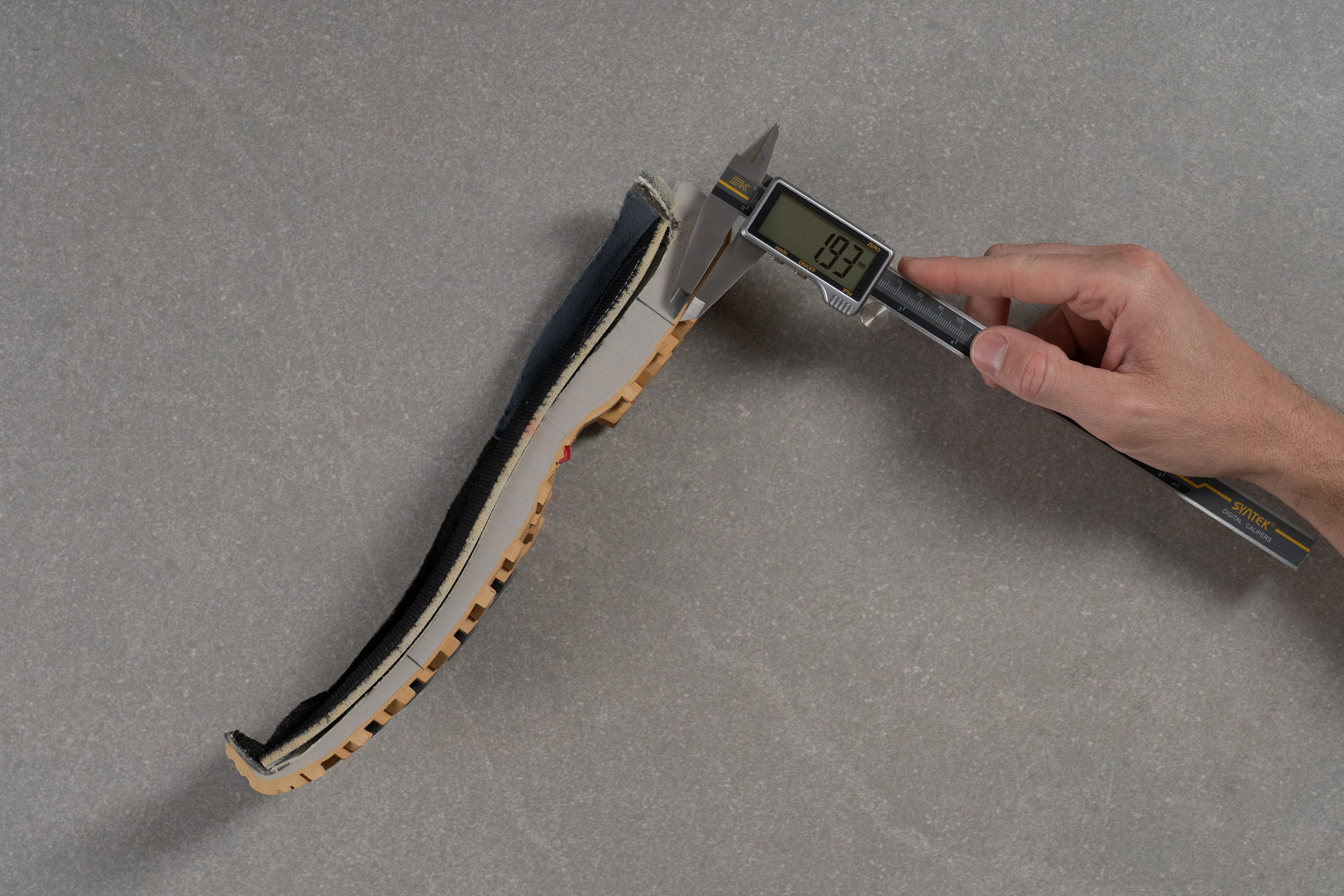
| X Ultra 360 Edge | 1.9 mm |
| Average | 2.5 mm |
Misc
Insole thickness
We were surprised to find that the X Ultra 360 Edge's insole is quite thin. At only 4.2 mm, it is not only thinner than average but also much thinner than the 7.6 mm insole of the cheaper X Ultra 360.
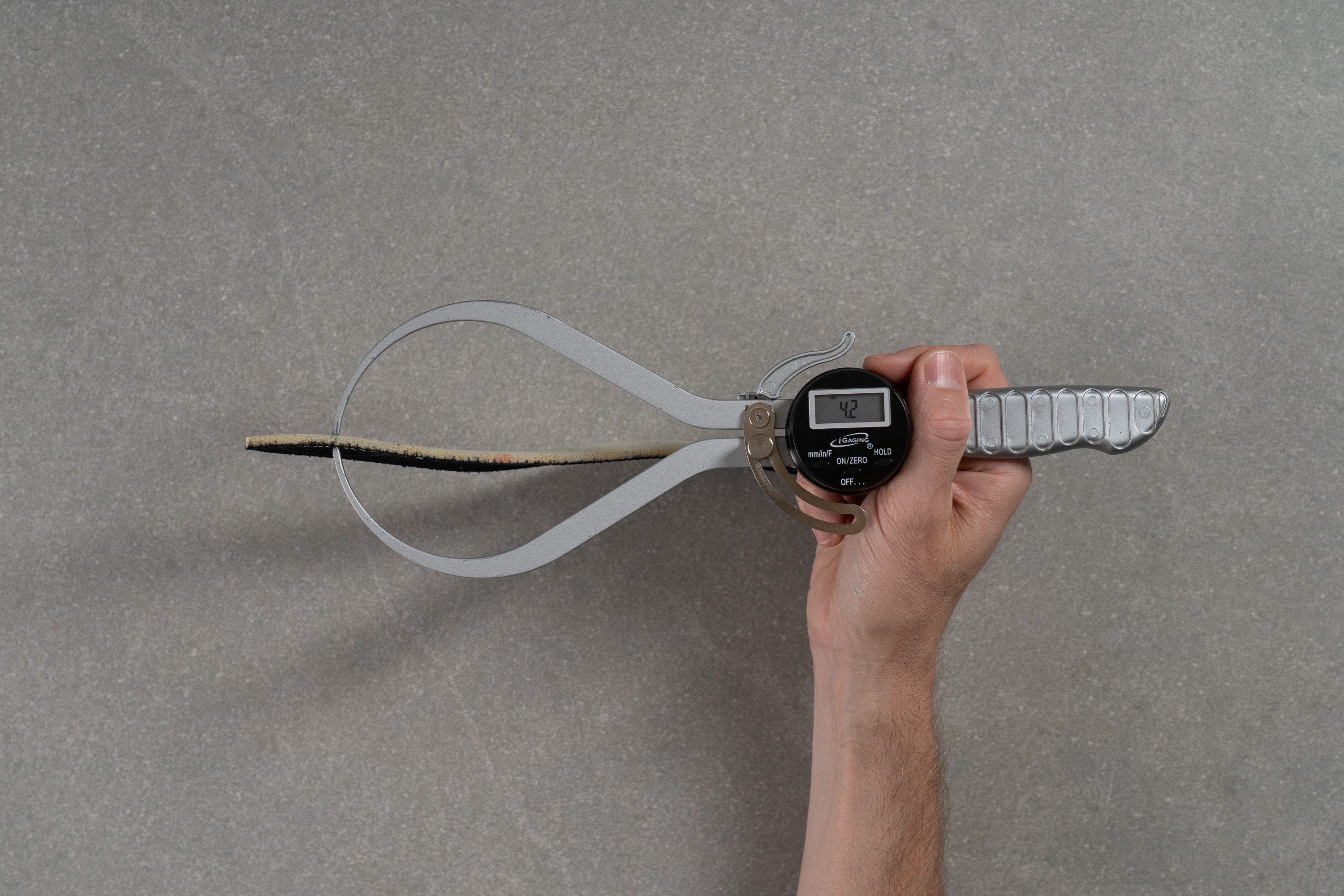
| X Ultra 360 Edge | 4.2 mm |
| Average | 5.3 mm |
Removable insole
But don't worry, if you need more support and cushioning underfoot, you can swap the stock insert with your own orthotic. Just be mindful of the shoe's narrower toe space, which may not fit every insert.
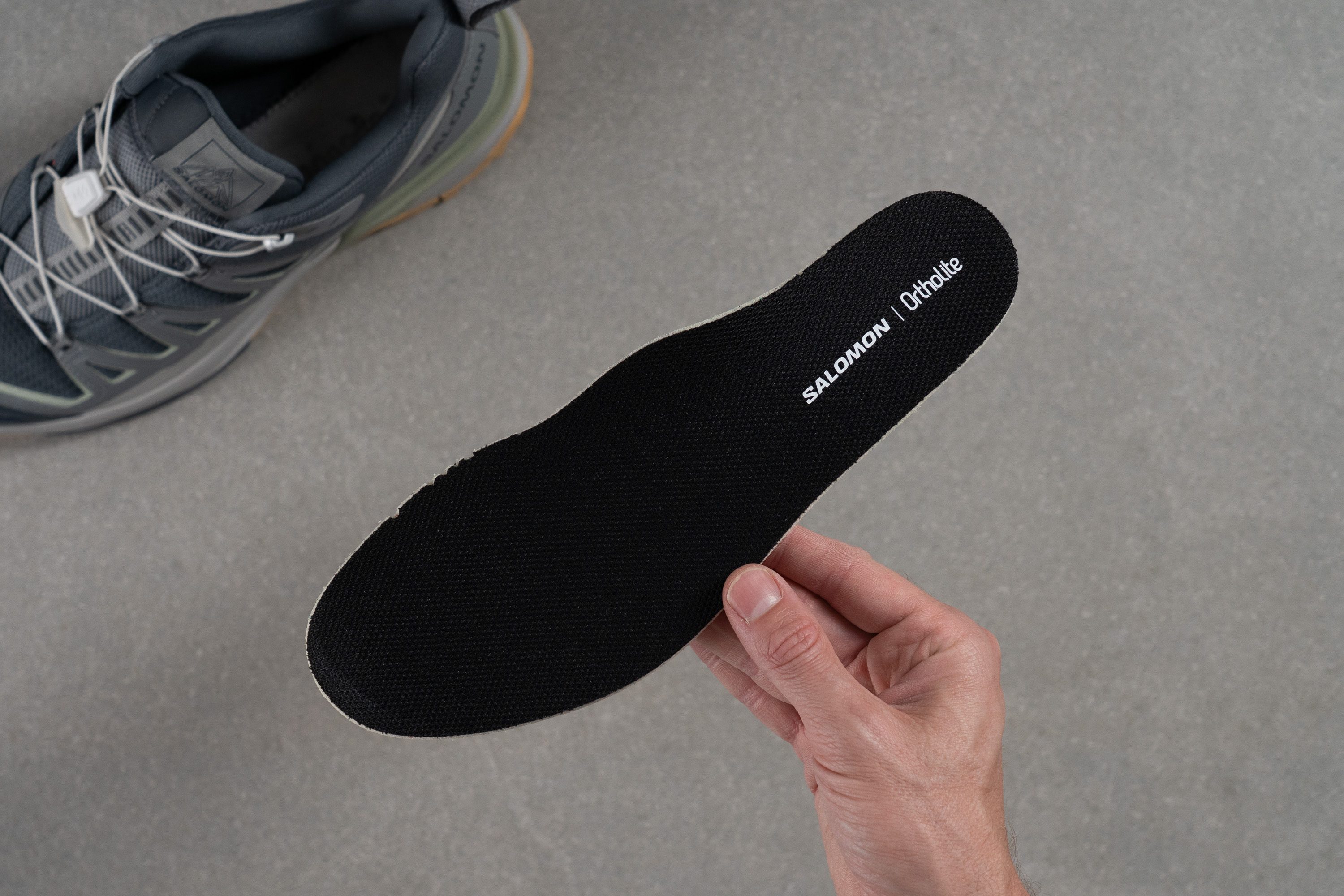
| X Ultra 360 Edge | Yes |
Midsole softness in cold (%)
Even though the shoe's midsole is quite firm in the first place, it gets even harder in low temperatures!
We were surprised to see that the durometer reading went from 31.3 HA at room temperature to a whopping 37.5 HA after 20 minutes in the freezer! That's a 20% difference in firmness.
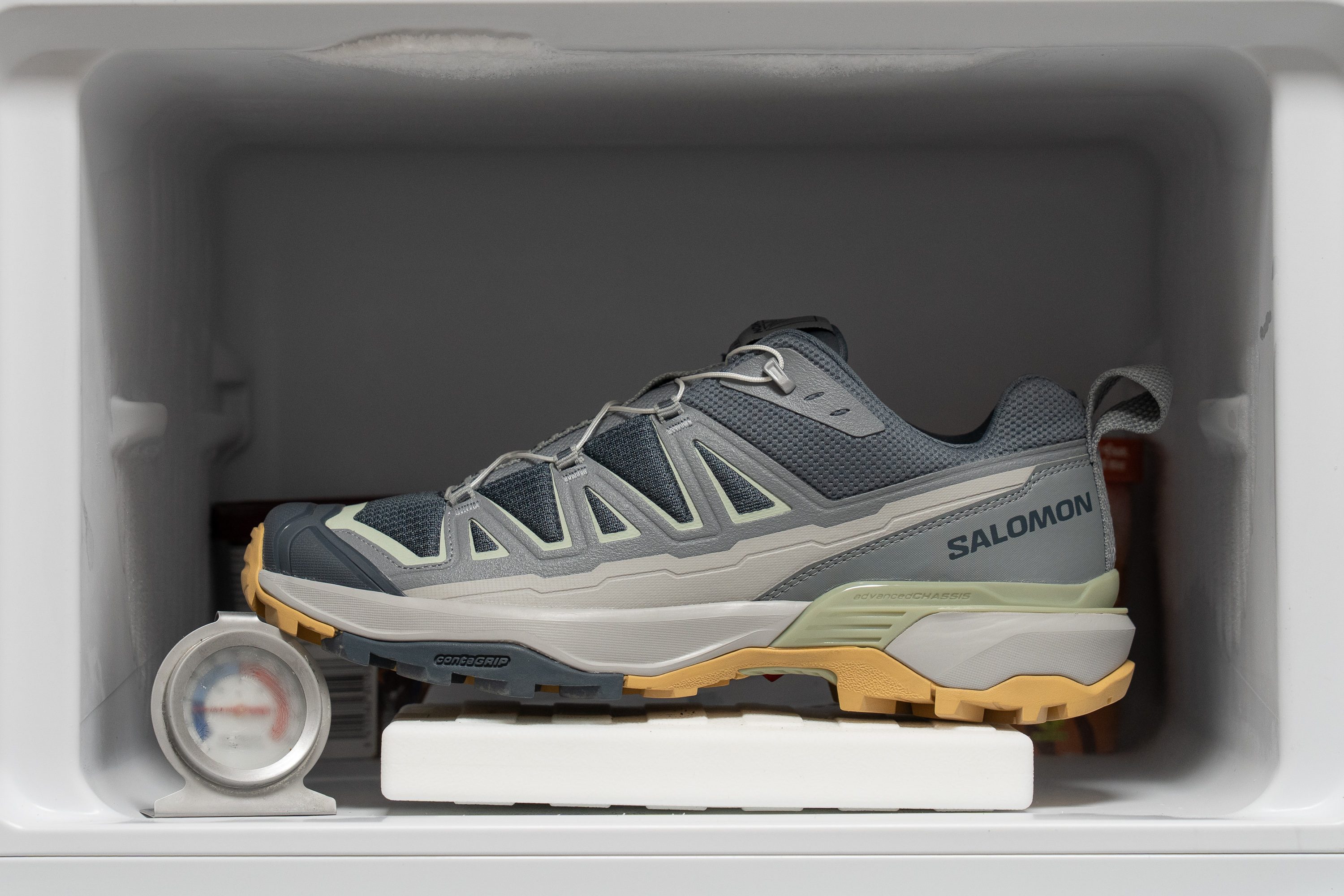
| X Ultra 360 Edge | 20% |
| Average | 19% |
Reflective elements
This Salomon shoe doesn't have any reflective components, as our dark room test showed.
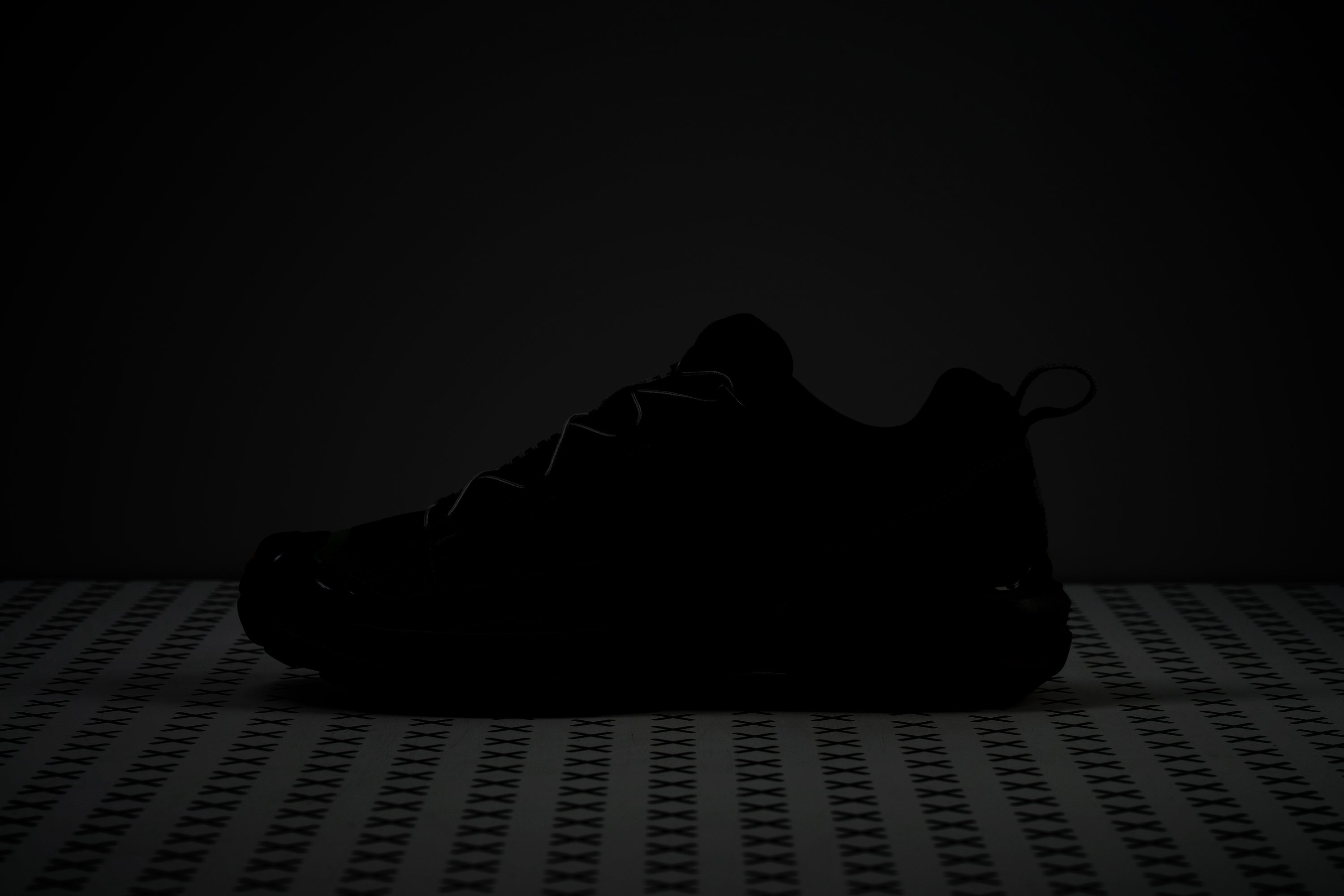
| X Ultra 360 Edge | No |
Tongue padding
It may not be well-cushioned, but the Salomon X Ultra 360 Edge is very generously padded!
Its tongue in particular packs a tonne of foam and showed a record-breaking thickness of 15.9 mm on our calliper!
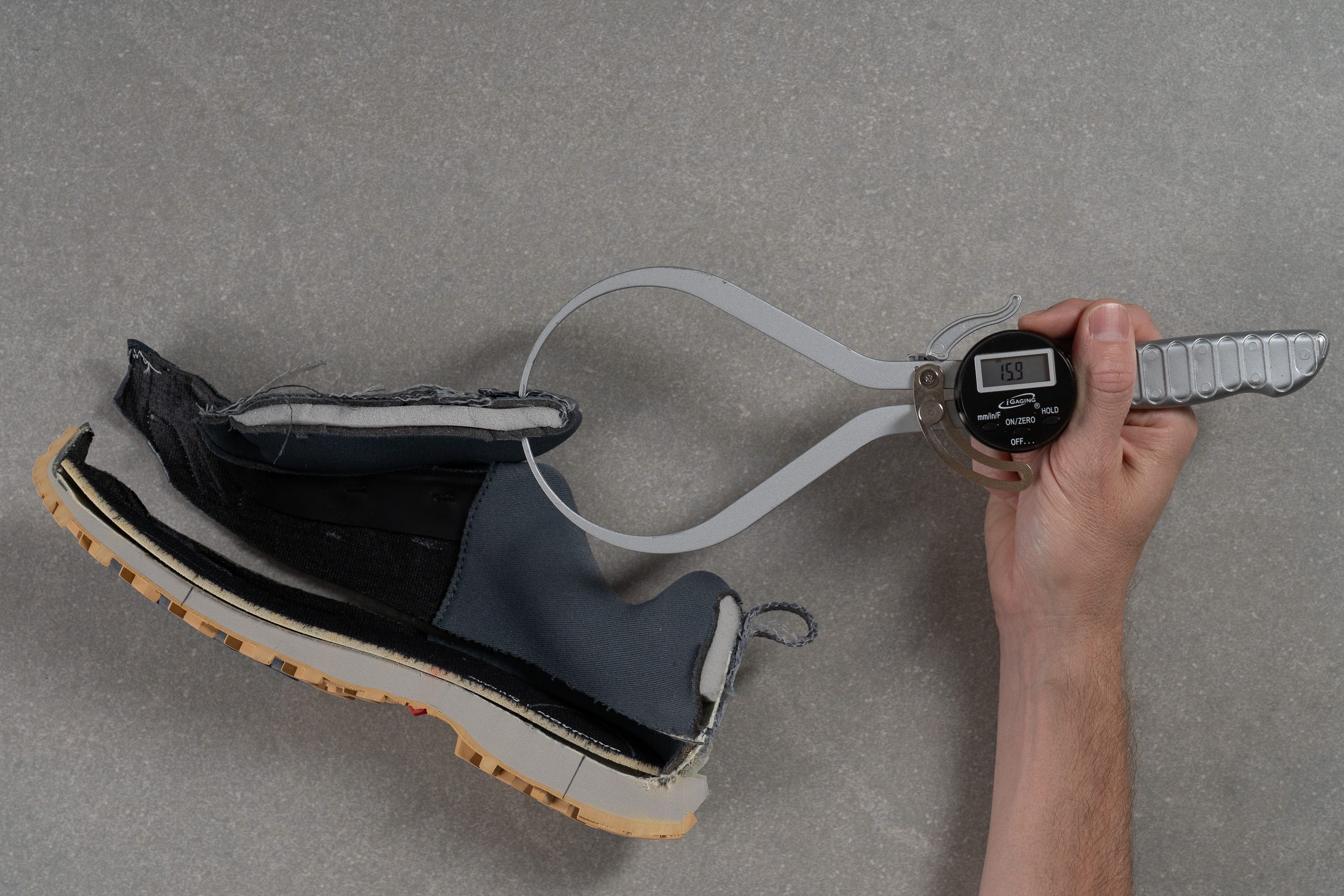
| X Ultra 360 Edge | 15.9 mm |
| Average | 10.2 mm |
Tongue: gusset type
The tongue of this X Ultra shoe is not gusseted, but it's not a problem for a non-waterproof shoe. We experienced no tongue shifting issues either.
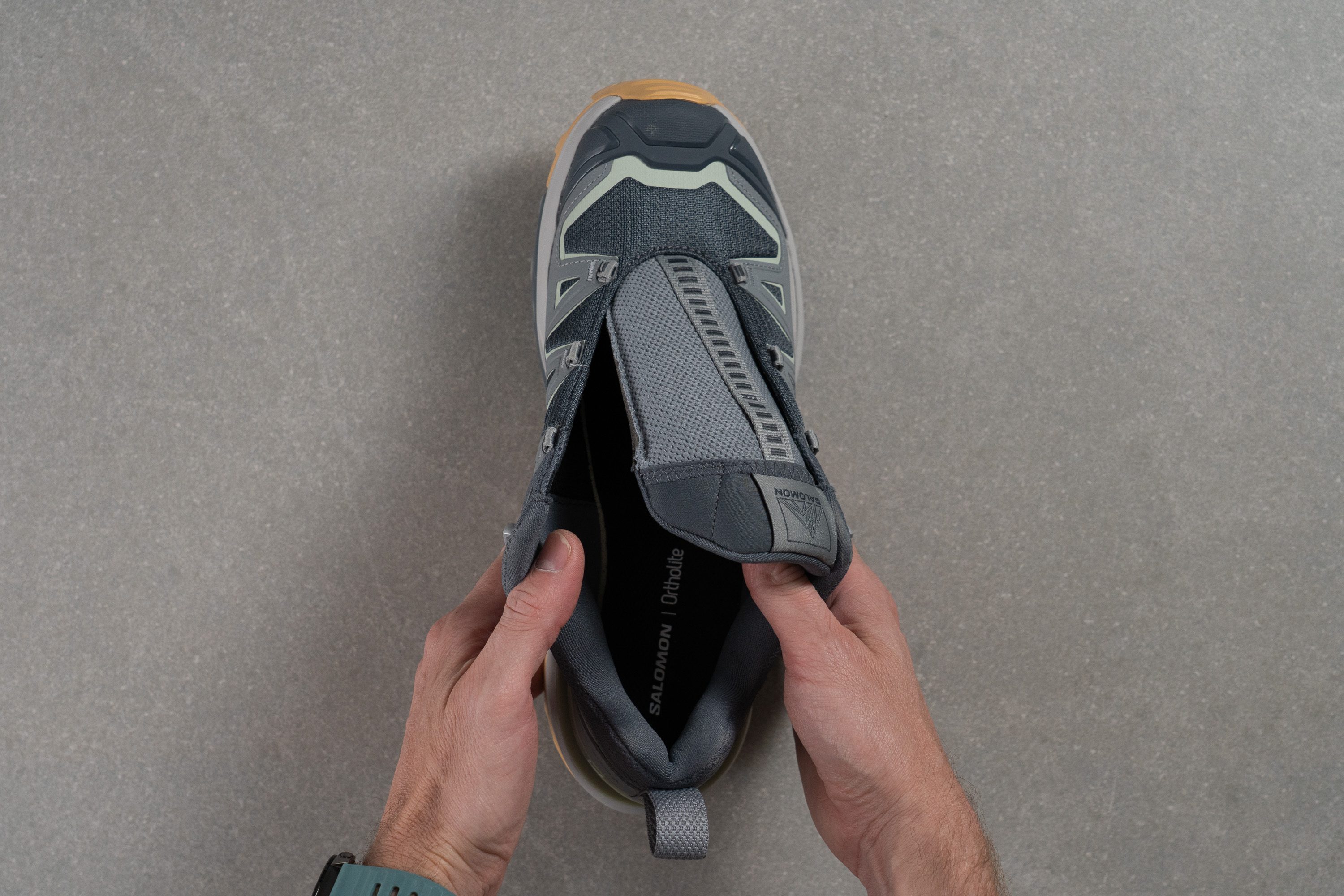
| X Ultra 360 Edge | None |
Heel tab
A large and sturdy finger loop at the back of the collar helps to get this Salomon shoe on quicker and easier.
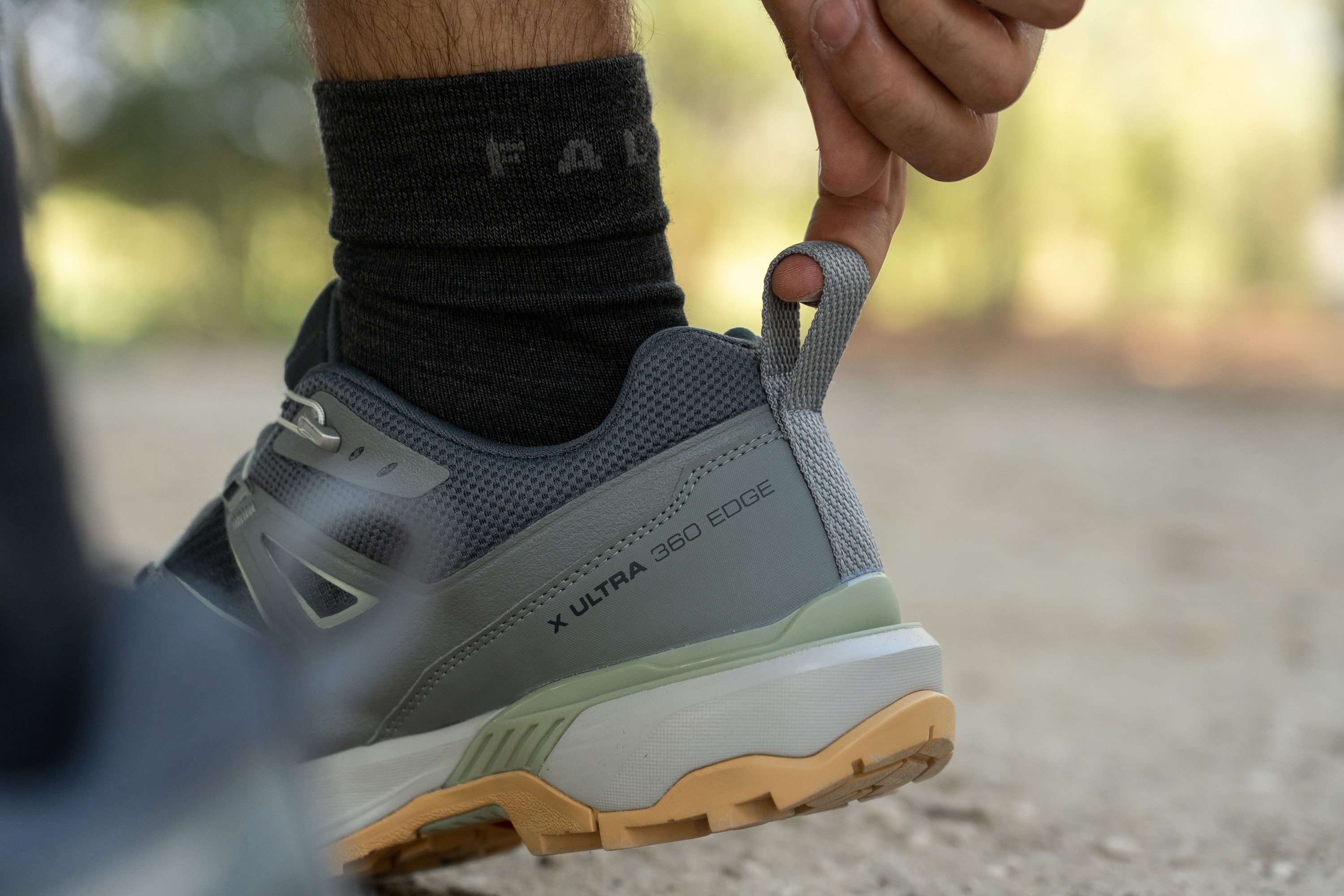
| X Ultra 360 Edge | Finger loop |
Price
The 360 Edge is one of the cheapest models in the Salomon X Ultra lineup. But we found that it delivers great value for money as a day hiking shoe for moderate hikes.
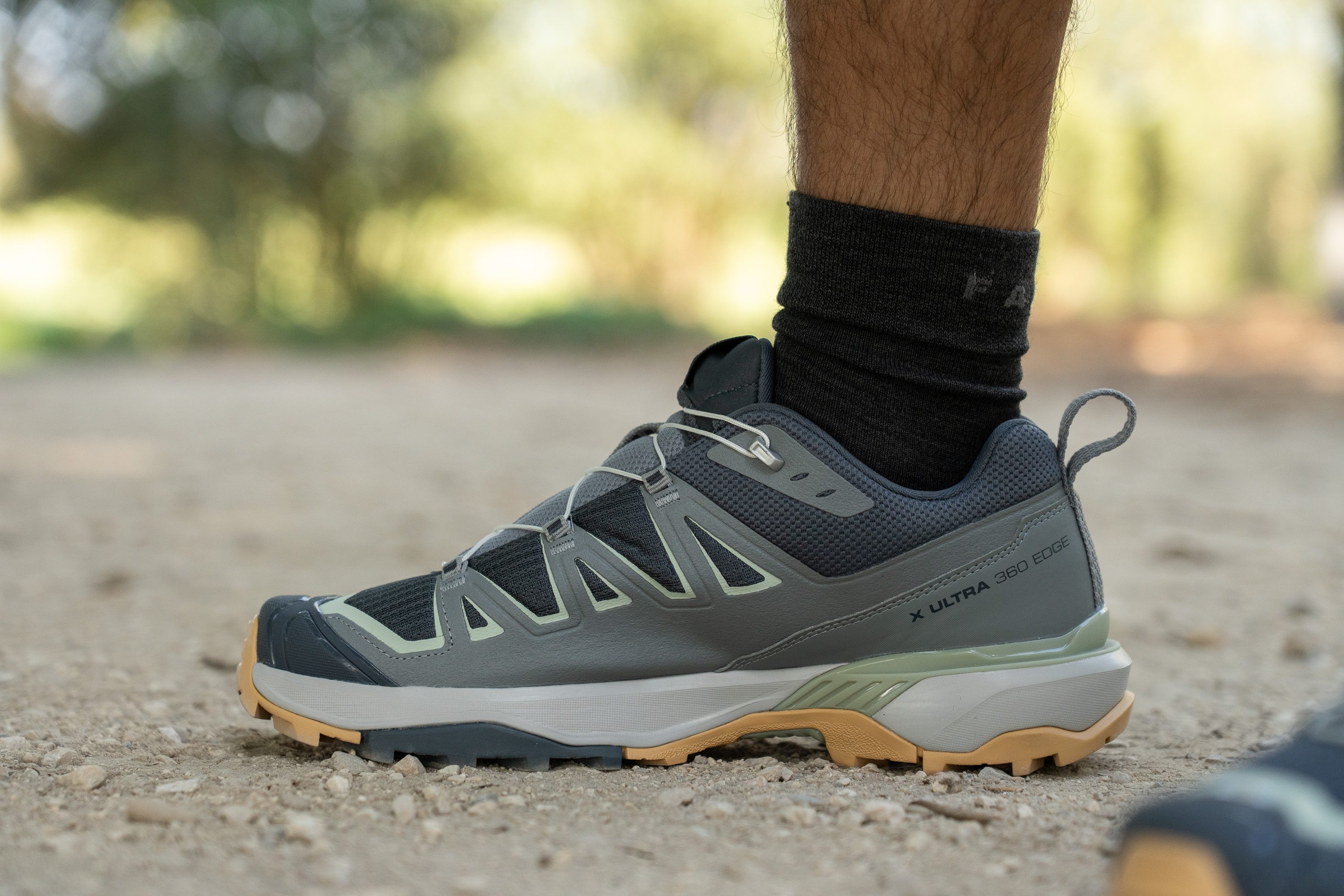
| X Ultra 360 Edge | $135 |
Sustainable materials
The main difference between the 360 Edge and the regular 360 shoe is the presence of sustainable materials in the Edge:
- 50% in the upper materials
- 8% in the midsole (recycled electric cables)
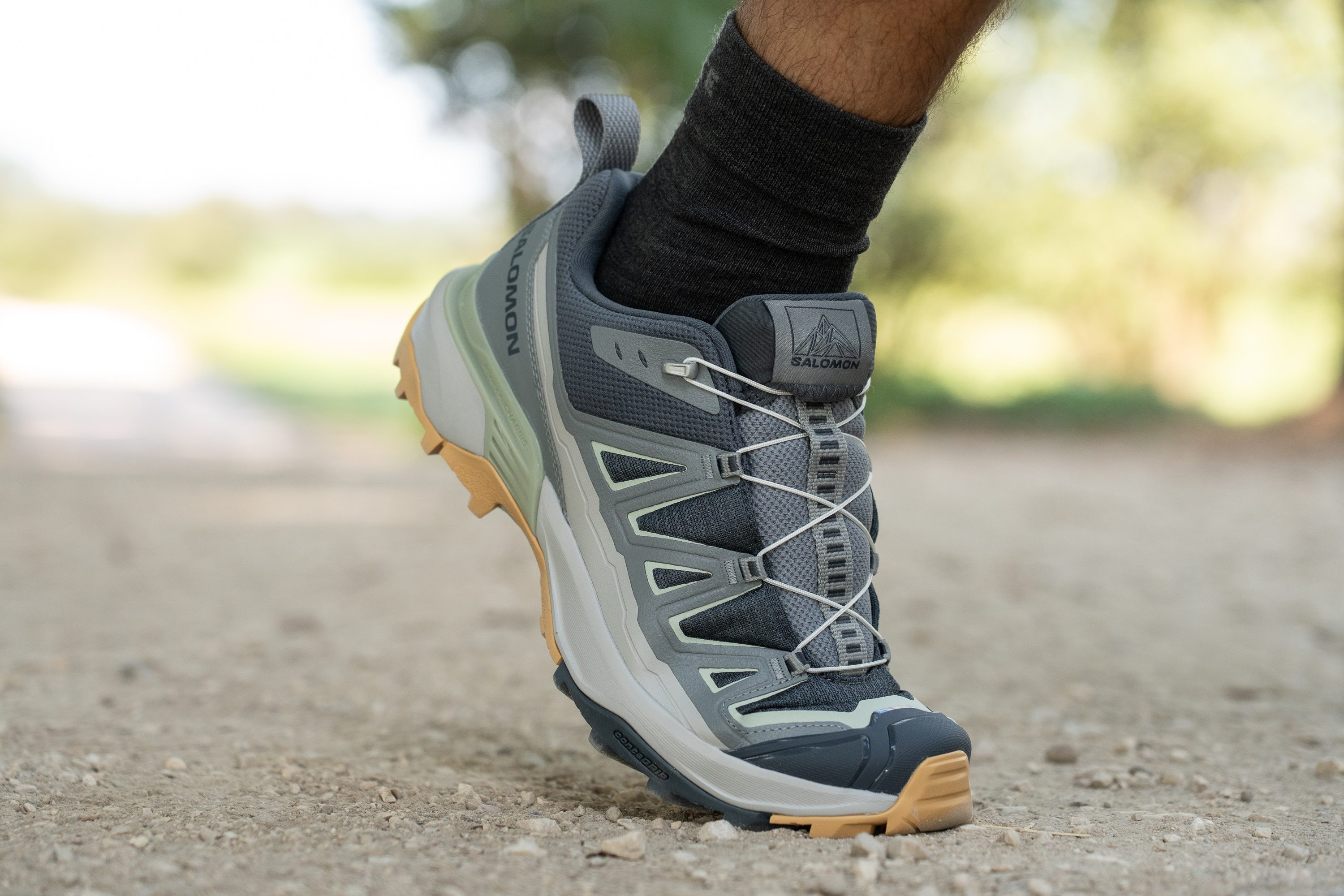
Quickclace
Assisting with the shoe's easy on-and-off is Salomon's proprietary Quicklace wire lacing. It can be regulated in seconds with the help of the toggle.
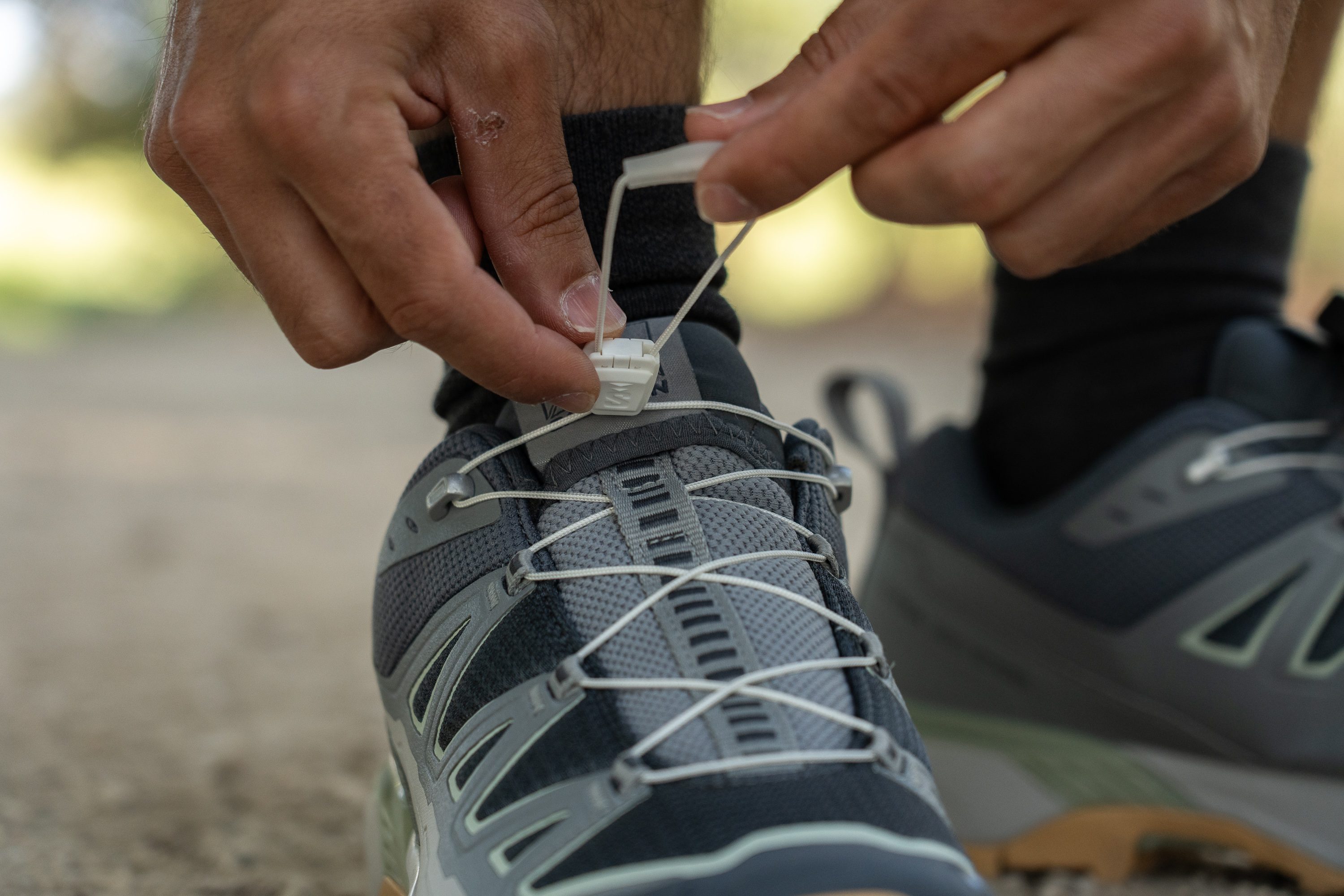
What's more, the excess shoestring length can be tucked inside a special pocket on the tongue.
